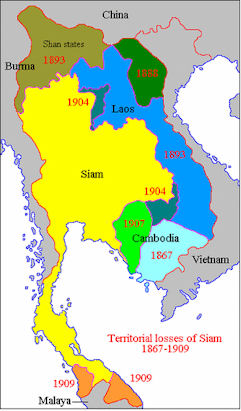

Zitierweise / cite as:
Payer, Alois <1944 - >: Chronik Thailands = กาลานุกรมสยามประเทศไทย. -- Chronik 1974 / B. E. 2517. -- Fassung vom 2017-03-18. -- URL: http://www.payer.de/thailandchronik/chronik1974.htm
Erstmals publiziert: 2012-10-03
Überarbeitungen: 2017-03-18 [Ergänzungen] ; 2016-12-08 [Ergänzungen] ; 2016-11-23 [Ergänzungen] ; 2016-11-04 [Ergänzungen] ; 2016-09-26 [Ergänzungen] ; 2016-09-11 [Ergänzungen] ; 2016-08-20 [Ergänzungen] ; 2016-05-28 [Ergänzungen] ; 2016-05-10 [Ergänzungen] ; 2016-04-25 [Ergänzungen] ; 2016-03-23 [Ergänzungen] ; 2015-12-28 [Ergänzungen] ; 2015-11-23 [Ergänzungen] ; 2015-09-01 [Ergänzungen] ; 2015-06-07 [Ergänzungen] ; 2015-05-30 [Ergänzungen] ; 2015-04-07 [Ergänzungen] ; 2015-02-26 [Ergänzungen] ; 2015-02-05 [Ergänzungen] ; 2014-11-01 [Ergänzungen] ; 2014-10-19 [Ergänzungen] ; 2014-10-09 [Ergänzungen] ; 2014-09-24 [Ergänzungen] ; 2014-09-15 [Ergänzungen] ; 2014-09-07 [Ergänzungen] ; 2014-08-21 [Ergänzungen] ; 2014-04-09 [Ergänzungen] ; 2013-10-13 [Ergänzungen] ; 2013-10-01 [Ergänzungen] ; 2013-09-27 [Ergänzungen] ; 2013-09-16 [Ergänzungen] ; 2013-06-28 [Ergänzungen] ; 2013-06-11 [Ergänzungen] ; 2013-06-04 [Ergänzungen] ; 2013-05-21 [Ergänzungen] ; 2013-04-30 [Ergänzungen] ; 2013-03-18 [Ergänzungen] ; 2013-01-25 [Ergänzungen] ; 2013-01-13 [Ergänzungen] ; 2012-10-08 [Ergänzungen]
©opyright: Dieser Text steht der Allgemeinheit zur Verfügung. Eine Verwertung in Publikationen, die über übliche Zitate hinausgeht, bedarf der ausdrücklichen Genehmigung des Herausgebers.
Dieser Text ist Teil der Abteilung
Thailand von
Tüpfli's Global Village Library
ช้างตายทั้งตัวเอาใบบัวปิดไม่มิด
|
Gewidmet meiner lieben Frau Margarete Payer die seit unserem ersten Besuch in Thailand 1974 mit mir die Liebe zu den und die Sorge um die Bewohner Thailands teilt. |
|
Bei thailändischen Statistiken muss man mit allen Fehlerquellen rechnen, die in folgendem Werk beschrieben sind:
Die Statistikdiagramme geben also meistens eher qualitative als korrekte quantitative Beziehungen wieder.
|
Statistik:
|
1961 - 2011
Inflationsrate der Konsumentenpreise
Abb.: Inflationsrate der Konsumentenpreise, 1961 - 2011
[Datenquelle: http://www.indexmundi.com/facts/thailand/inflation. -- Zugriff am 2014-04-09]
1974
Bevölkerungsdichte:
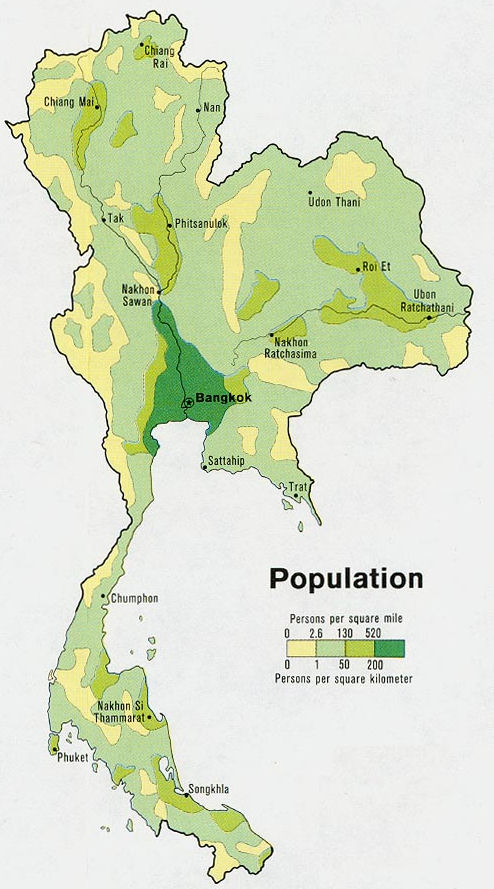
Abb.: Bevölkerungsdichte Thailands, 1974
[Bildquelle: CIA. -- Public domain]
1973 - 1976
Pressure Groups
Abb.: Anzahl der Pressure Groups und der von ihnen organisierten Proteste 1973 bis 1976
[Datenquelle: Morell, David ; Chai-anan Samudavanija [ชัยอนันต์ สมุทวณิช] <1944 - >: Political conflict in Thailand : reform, reaction, revolution. -- Cambridge, Mass. : Oelgeschlager, 1981. -- 362 S. : Ill. ; 24 cm. -- ISBN 0-89946-044-5. -- S. 156]
1974
Gründung des Secondary School Students Center of Thailand (SSSCT). Generalsekretär: Thongchai Winichakul (ธงชัย วินิจจะกูล, 1957 - ). Das SSSCT ist linksradikal.
"Thongchai Winichakul (Thai: ธงชัย วินิจจะกูล; rtgs: Thongchai Winitchakun; IPA: [tʰōŋ.tɕʰāj wí.nít.tɕà.kūːn]), is a Professor of Southeast Asian History at the University of Wisconsin–Madison. He is of Sino Thai descent. Thongchai has had a major impact on the concept of Thai nationalism. His best-known academic work is his book, Siam Mapped, which critiqued existing theories of Thai historiography. In its Japanese translation, the book won the Grand Prize of the 16th Asian Pacific Awards from the Asian Affairs Research Council. Thongchai was named to the American Academy of Arts and Sciences in 2003. He was the President for the Association for Asian Studies in 2013. Political activity
Thongchai was a student organizer and political activist while still in high school. He became even more involved in pro-democracy movements while in his first two years as an undergraduate at Thammasat University (มหาวิทยาลัยธรรมศาสตร์) in Bangkok. Student and labor organizing had blossomed during and after the popular uprising of October 14, 1973 (เหตุการณ์ 14 ตุลา). But following the return of disempowered military dictator Thanom Kittikachorn (ถนอม กิตติขจร, 1911 - 2004) and the resignation of Prime Minister Seni Pramoj (เสนีย์ ปราโมช, 1905 - 1997), Thongchai and other student leaders organized a fresh wave of protests centered at Thammasat University. These culminated in a large rally that grew through the night of October 5 following. The next morning, October 6, the Thai military surrounded the Thammasat campus and attacked the students in what has been described as the "Thammasat University massacre" (เหตุการณ์ 6 ตุลา, 1976) in which at least 46 people were killed, some even being raped, hung, or burned to death. Many students escaped. Thousands of students were arrested, though 19 were eventually imprisoned, including Thongchai. Various organizations, including Amnesty International, advocated for his release as a prisoner of conscience. He was released on September 16, 1978 and allowed to return to finish his education at Thammasat on the condition that he was not involved in further political activities. He later went to Sydney, Australia, for his graduate education.
Academic careerThongchai completed his Bachelor of Arts degree with first class honors from Thammasat University in 1981. He received his Master's degree with honors from University of Sydney in 1984. In 1988, he was conferred his doctoral degree from the same university. Subsequently, he returned to Bangkok to lecture at the Thammasat University until 1991.
He was then appointed assistant professor at the University of Wisconsin. He has stayed in Madison, being promoted associate professor in 1995, and full professor in 2001. He is assigned to both the Department of History and the Center for Southeast Asian Studies. Among other positions, he served as Director of the Center for Southeast Asian Studies from 1997 to 1999, and Director of Graduate Studies of the Department of History from 2008.
Since 1991, he has been a member of the Association for Asian Studies (AAS), chairing its Southeast Asia Council and serving on its Executive Board in 1996/97. In 2012, he was Vice President, in 2013 President of the AAS. Moreover, he was a Principal Research Fellow at the Asia Research Institute, National University of Singapore from 2010 to 2012."
[Quelle: https://en.wikipedia.org/wiki/Thongchai_Winichakul. -- Zugriff am 2015-011-15]
1974
"A magazine published by the Buddhist and Thai cultural group of a Bangkok high school in 1974 illustrates the depth of these attitudes. The author of one article, presumably a high school student, declared that Thai youths had to be united and coordinate their struggle with the masses in order to destroy "the rotten and reactionary social system" and establish "a new social order with real independence and freedom. ... A declaration of war is hereby proclaimed. From the struggle over the educational system to the struggle in the factories and in the rice fields, the force of youth and the people alone will determine everything." A poem titled "The Revolutionary Youth" in another student magazine, Yuwathat [ยุวทัศน์], appealed to students to take up arms against "capitalists, feudalists and the bourgeoisie.""
[Quelle: Morell, David ; Chai-anan Samudavanija [ชัยอนันต์ สมุทวณิช] <1944 - >: Political conflict in Thailand : reform, reaction, revolution. -- Cambridge, Mass. : Oelgeschlager, 1981. -- 362 S. : Ill. ; 24 cm. -- ISBN 0-89946-044-5. -- S. 162]
1974
Die Thammasat Student Organization organisiert eine erfolgreiche Ausstellung über Rotchina
1974
An Universitäten werden Propagandaschriften der Communist Party of Thailand gratis verteilt, wie z.B.
ชีวทัศน์เยาวชน [Lebensansichten der Jugend]
Abb.: Kommunistische Literatur
[Fair use]
1974
Gründung der Population and Community Development Association (PDA) (สมาคมพัฒนาประชากรและชุมชน), einer NGO zur Förderung der Familienplanung.
Abb.: ®Logo
1974
Vegetation:
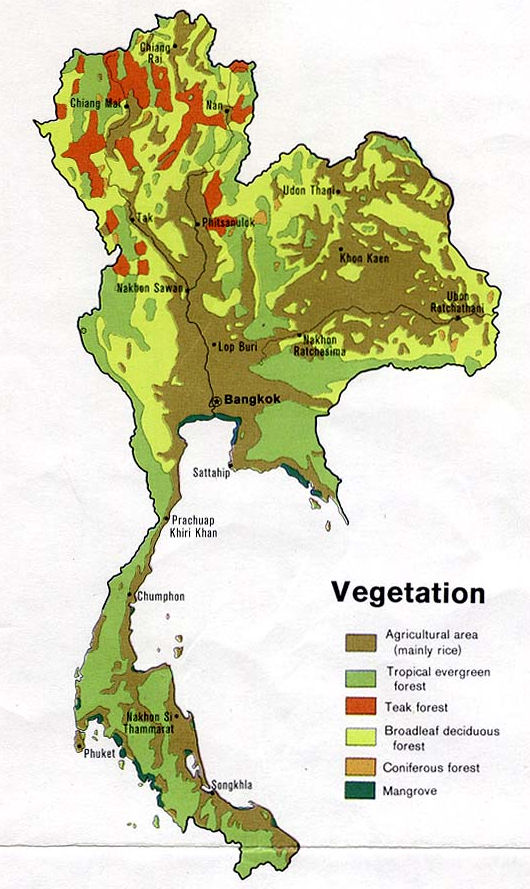
Abb.: Vegetation Thailands, 1974
[Bildquelle: CIA. -- Public domain]
1974
Wirtschaft:
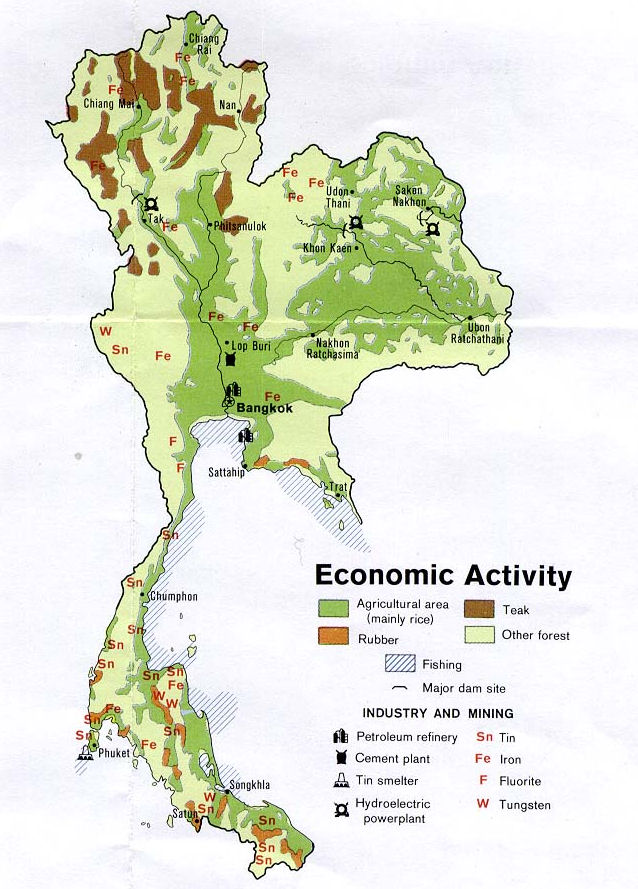
Abb.: Die Wirtschaft Thailands, 1974
[Bildquelle: CIA. -- Public domain]
1974
Neue 50-Baht-Münze (บาท):
Abb.: 50-Baht-Münze (บาท) ab 1974
[Bildquelle: th.Wikipedia]
1994 - 1998
Mindestlohn pro Tag:
Abb.: Mindestlohn pro Arbeitstag in Bangkok und Umgebung und in Nordostthailand (ohne Korat), 1974 - 1998
[Datenquelle: Thailand in figures (2000), S. 140]
1974
Eine von Studierenden durchgeführte Erhebung nennt als Probleme, die das Leben der Bauern am schwersten belasten, u.a.:
police protection
- "Inadequate
Abuse of law by some police officers Some people have been mistreated and unfairly accused of being communists Poverty contributes to the decision of some to turn to the communists Local élites have too much influence over local politics and administration Some local leaders intimidate ordinary people Misconduct by members of volunteer defense units High prices for food and other commodities Low levels of income Underemployment Lack of capital to purchase items needed for agricultural production Barren, unproductive land High interest rates High rents for farm land Lack of adequate irrigation facilities Rural people are uneducated Shortage of schools, teachers, school equipment Shortage of health centers, doctors, medicines." [Zitiert in: Rosenberg, Klaus <1943 - 1988>: Sozialkritische Literatur in Thailand : Protest und Anklage in Romanen und Kurzgeschichten eines Landes der Dritten Welt. -- Hamburg : Ges. für Natur- u. Völkerkunde Ostasiens, 1986. -- 360 S. ; 21 cm. -- (Gesellschaft für Natur- und Völkerkunde Ostasiens: Mitteilungen der Gesellschaft für Natur- und Völkerkunde Ostasiens e.V. Hamburg ; Bd. 101). -- S. 85]
1974
Pachtkontrollgesetz: Statt wie bisher üblich 50% des Ernteertrags als Pacht für landwirtschaftliches Land, dürfen nur noch 33,3% gefordert werden. Durch weitere Bestimmung werden die Rechte des Pächters gestärkt. Das Gesetz stößt auf harten - oft gewaltsamen - Widerstand der Grundbesitzer. Die politischen Behörden weigern sich teilweise, den Bauern das neue Gesetz bekannt zu machen.
1974
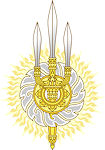
Provinz Narathiwat (นราธิวาส): Gründung des ersten Projekts der Königin zum Flechten von yan lipao Korbwaren (ย่านลิเภา). Das Rohmaterial ist ein Kletterfarn (Lygodium sp. = ย่านลิเภา)
Abb.: yan lipao (ย่านลิเภา)
[Bildquelle: http://kanchanapisek.or.th/kp6/sub/book/book.php?book=21&chap=6&page=t21-6-infodetail02.html. -- Zugriff am 2014-11-01. -- Fair use]
Abb.: Lage der Provinz Narathiwat (นราธิวาส)
[Bildquelle: CIA. -- Public domain]
1974
Eröffnung des National Museum (พิพิธภัณฑสถานแห่งชาติ) Nakhon Si Thammarat (นครศรีธรรมราช)
Abb.: Lage von Nakhon Si Thammarat (นครศรีธรรมราช)
[Bildquelle: OpenStreetMap. -- Creative Commons Lizenz (Namensnennung, share alike)]
1974
Englisch wird Pflichtfach an den Universitäten.
1974
Offizielle Karte zur kommunistischen Infiltration:
Abb.: Gebiete mit kommunistischer Infiltration, 1974
1974
Die Armee beginnt in Nordostthailand mit zivilen Entwicklungsprojekten, um die kommunistische Infiltration zu stoppen.
1974
Wattana Kiewvimol (ดร. วัฒนา เค เขียววิมล) gründet die rechtsradikale Bewegung Nawaphon (ขบวนการนวพล).
"The Nawaphon movement (Thai: ขบวนการนวพล, alternatively transcribed as Navapol, Nawapol, Nawaphol, translating to both "New Force" and "Ninth Force"[1]) was a Thai extreme right-wing[2] patriotic[3] and Buddhist[2] organization active during the country's short democratic phase in the mid-1970s. It was set up by Wattana Kiewvimol (ดร. วัฒนา เค เขียววิมล) in 1974. Wattana had been the head of the Thai Students Association in the United States, when studying at the Seton Hall University.[3] Nawaphon was supported by the Internal Security Operations Command (กองอำนวยการรักษาความมั่นคงภายใน) of the Thai military[4] and the Ministry of Interior (กระทรวงมหาดไทย).[1] The group was said to have links to wealthy businessmen, politicians, the National Security Council and the Thai military intelligence.[2] Nawaphon rallied merchants, businessmen, and monks, that were opposed to social change and democracy, fearing for their possessions.[4] A notable supporter of the organization was the popular monk Kittiwuttho Bhikkhu (กิตติวุฑโฒภิกขุ, 1936 - 2005), who infamously said that killing communists was not a sin.[5][6] The movement was opposed to parliamentary democracy and campaigned for the three principles Nation, Religion and Monarchy.[3] Nawaphon attracted considerable support due to the common feeling that these national principles were threatened by left-wing forces.[3] In the mid-1970s the movement was reported to have 500,000 followers. Nawaphon played a key role in the anti-leftist agitation that led to the Thammasat University massacre on 6 October 1976 (เหตุการณ์ 6 ตุลา),[3] in which members of the organization were involved.[2] After the immediately following military coup re-establishing the military rule, Nawaphon's popularity diminished.[3]"
[Quelle: http://de.wikipedia.org/wiki/Nawaphon. -- Zugriff am 2012-06-19]
"Perceiving that most Thais continued to view politics and political parties as tainted institutions, Nawaphon's [ขบวนการนวพล] leaders termed their group a movement, not a political party. They constantly emphasized that their group was involved in kan chat [การชาติ] (national affairs), not kan muang [การเมือง] (politics). Many believe that Nawaphon received much of its financial and material support from elements of the army, police, and ISOC [Internal Security Operations Command - กองอำนวยการรักษาความมั่นคง ภายในราชอาณาจักร], from leading individuals within them if not officially from these institutions. Like the NSCT [National Student Center of Thailand - ศูนย์นิสิตนักศึกษาแห่งประเทศไทย], Nawaphon reached well beyond Bangkok, but its principal targets were residents of provincial and district towns, not villages. The group’s organizers used mass meetings to whip up support. In addition, they employed an organizational cell structure parallel to that of the communists. Nawaphon cadres identified potential leaders for special political and motivational training at district, provincial, and national levels. As of late 1975, they claimed to have over one million active members. Although this figure may have been inflated, there was no question that, within less than a year, Nawaphon had become a very powerful new ultranationalist political institution.
Wattana Kiewvimol [วัฒนา เขียววิมล], creator of Nawaphon, had been head of the Thai Students Association in the United States while he studied at Seton Hall University. According to Wattana, at that time he sought out a number of U.S. political leaders and groups, allegedly including Vice President Spiro Agnew [1918 - 1996] and the CIA; and when he returned to Thailand in 1974 he used these connections to impress ISOC leaders with his credibility, sincerity, and potential. Apparently, he electrified ISOC’s leadership with his predictions of the danger to Thailand posed by newly enfranchized liberal activists, and his claim that his close ties to U.S. intelligence agencies gave him access to secret information. He apparently did persuade some ISOC leaders to support a fund drive to establish a new organization (Nawaphon) committed to preservation of the nation and monarchy and to the defeat of communism in Thailand. Because it would not be a political party, it would not face the traditional disdain for parties or waste itself on the futility of parliamentary activity. Instead, Nawaphon would be an alliance of nonpolitical patriots.
In 1974, Wattana was in his early thirties, short and somewhat stout, dynamic to the point of frenzy. He strutted and shouted, jumped up and down while talking, and answered questions before his questioners had half begun to express their thoughts. He had a message to impart, and no question or challenge was capable of breaking the flow of his well-rehearsed routine. Where Nawaphon received its financial support was never entirely clear, but it was always able to meet its high level of expenses.
Wattana concentrated his considerable organizational energies on the provincial and district towns, where Nawaphon meetings were run in the style of a religious revival. Upwards of a thousand middle- and lower-class town residents were assembled in the street outside the local government office. On the platform in front of the crowd were the national flag and photographs of the king and queen. Wattana led many of the Nawaphon rallies himself, microphone in hand, urging the crowds to a hysterical pitch of fear, anger, and loyalty. "Do you love your king? Do you love Thailand? Do you hate communism?" The response to each question was a roar of assent.
"Then will you sign a petition for your king and your country before the communists overrun Thailand?"
People filed by the platform, signing by the hundreds, and each signature was counted as a membership in Nawaphon. Selected members were later trained in political ideology, with periodic courses given at district and provincial towns and at Nawaphon’s home office in Bangkok. The well- known anticommunist Buddhist monk Kittiwutho Bhikku became involved with this group, which further contributed to its appeal.10 In Udorn, as in many provinces, police officers and patrolmen joined the group and marched in street demonstrations, wearing civilian clothes. According to Wattana:
The "establishment right" is concerned only with money and status; they are selfish. Nawaphon is on the "ideological right." We are concerned with justice and democracy, through stability with change. We don’t have to destroy the rich or the "establishment right"; we can find ways to work with them.
Each Nawaphon (the word was used to refer to each member as well as to the group) was responsible for recruiting ten more members. Members in one group might not know those in another. Ideally, each local area was to have fifty members; each tambon [ตำบล] (group of villages) 1000 members; each district [อำเภอ] (ten tambon) 10,000 members; and so on. Using the organizational tactics of the left while espousing the sentiments of the right, Wattana and his organization were enormously successful.
Reports suggest that ISOC later discontinued its official support of Wattana and Nawaphon, although some of its officials still contributed money and time as private individuals. Apparently, some ISOC officials were alarmed by the organization’s later growth, suspecting that they had been tricked by Wattana into lending their credibility to his personal ambitions."
[Quelle: Morell, David ; Chai-anan Samudavanija [ชัยอนันต์ สมุทวณิช] <1944 - >: Political conflict in Thailand : reform, reaction, revolution. -- Cambridge, Mass. : Oelgeschlager, 1981. -- 362 S. : Ill. ; 24 cm. -- ISBN 0-89946-044-5. -- S. 239f. -- Fair use]
1928 - 1975
Anzahl der Automobile:
Abb.: PKW und Nutzfahrzeuge (in 1000 Fahrzeuge) 1928 - 1975
[Datenquelle: Mitchell (1982), S. 571]
Abb.. Songthaew (สองแถว), Bangkok, 2011
[Bildquelle: Philip Roeland. -- http://www.flickr.com/photos/philiproeland/6252789499/. -- Zugriff am 2012-01-30. -- Creative Commons Lizenz (Namensnennung, keine kommerzielle Nutzung, keine Bearbeitung)]
1968 - 1975
Unter thailändischer Flagge fahrende Handelsschiffe mit über 100 Bruttoregistertonnen:
Abb.: In Thailand registrierte Handelsschiffe mit über 100 Bruttoregistertonnen (Anzahl und Gesamt der Bruttoregistertonnen), 1968 - 1975
[Datenquelle: Mitchell (1982), S. 557]
Abb.: Handelsschiff "Harinnavee7", erbaut 1988, registriert in Thailand, 1021 Bruttoregistertonnen, 2009
[Bildquelle: pete. -- http://www.flickr.com/photos/wirralwater/3840112063/. -- Zugriff am 2012-01-30. -- Creative Commons Lizenz (Namensnennung)]
ca. 1974
Es erscheint der Song:
ฉวีวรรณ ดำเนิน [Chawiwan Damnoen] <1945 - >: ชีวิตชาวนา ["Das Leben von (Isan-)Reisbauern"]. In der gleichnamigen Audiokassette,
Abb.: Chawiwan Damnoen [ฉวีวรรณ ดำเนิน], 2013
[Bildquelle: Direkkhunaphoo / Wikimedia. -- Creative Commons Lizenz (Namensnennung, share alike)]
Abb.: Cover einer Neuausgabe auf CDDer Song (anderer Sänger) auf Spotify:
URI: spotify:track:21meNyM2TMCGeliDc7bnSf
URL: https://open.spotify.com/track/21meNyM2TMCGeliDc7bnSf
1974
Im TV-Kanal MCOT Channel 9 (โมเดิร์นไนน์) läuft das Lakorn (ละคร - Soap Opera) Jam Loey Rak (จำเลยรัก).
"Jam Loey Rak (จำเลยรัก) is a 1960 novel by Chuwong Chayachinda (ชูวงศ์ ฉายะจินดา, 1930 - ) which has been adapted for two movies and five television series. Plot
The story of Soorya (โศรยา) whose life changed when she was kidnapped by Harit Rangsiman, a landowner who mistakes her for her cousin who caused his brother's death. Humiliated and forced to work, Soorya strikes up a friendship with a deaf and dumb man who was also a victim of Harit's crulety. Harit realisesd his mistake and releases Soorya, but only to allow her to spy on her cousin, which leads to her downfall."
[Quelle: http://en.wikipedia.org/wiki/Jam_Loey_Rak. -- Zugriff am 2012-03-06]
1974
Es erscheint der Roman:
นิมิตร ภูมิถาวร [Nimit Poomthavorn] <1936 - 1981>: แด่คุณครูด้วยคมแฝก. -- Das Buch wird als bester Roman des Jahres ausgezeichnet.
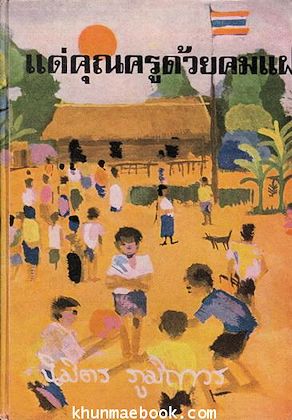
Abb.: Einbandtitel einer Ausgabe.
Ampha Otrakul [อําภา โอตระกูล, 1934 - ] über den Autor und den Roman:
"Nimit Pumthaworn [นิมิตร ภูมิถาวร], 1936-1981, war Hauptlehrer an einer Dorfschule in der Stadt Sukhothai [สุโขทัย]. Als Schriftsteller ist Nimit Pumthaworn bekannt durch seine Kurzgeschichten über Leben und Treiben der Menschen in der Bauernwelt. Nimit Pumthaworns kurzer Roman "Dä Kun Kru Duai Kom Fäg" [แด่คุณครูด้วยคมแฝก] wurde mit dem ersten Preis als bester Roman des Jahres 1974 ausgezeichnet. Das Buch übt Kritik an der unzulänglichen Schulpolitik des Erziehungsministeriums und deckt in satirischer Weise all die dazugehörigen Probleme im Lehrbetrieb auf dem Land auf.
[Quelle: Kurzgeschichten aus Thailand / ausgewählt und übersetzt von Ampha Otrakul [อําภา โอตระกูล, 1934 - ]. -- Bangkok : Chalermit, [1982]. -- 312 S. ; 20 cm. -- ISBN 974-7390-08-6. -- S. 26]
1974
Es erscheint die sozialkritische Sammlung von Gedichten und Kurzgeschichten:
วิสา คัญทัพ [Wisa Khanthap]: เราจะฝ่าข้ามไป [Wir werden uns hindurchkämpfen]
Abb.: Einbandtitel
"Als Wisa [วิสา คัญทัพ] im Jahr 1974 seinen ersten Sammelband mit Gedichten und Kurzgeschichten - 'Wir werden uns hindurchkämpfen' [เราจะฝ่าข้ามไป] - veröffentlichte, verfasste er dazu ein mit 'Ich lebe in einem Zeitalter des Kampfes' überschriebenes Vorwort, das ebenfalls als charakteristisches Selbstzeugnis eines engagierten Autors im Thailand jener Jahre von Interesse ist. Aus ihm spricht ein Gefühl des Abscheus vor einem Zustand von Staat und Gesellschaft, der als zutiefst korrupt und degeneriert empfunden wird, aber auch die von Optimismus und Idealismus getragene Entschlossenheit zum Kampf gegen die Kräfte des Alten und zum Aufbau einer besseren neuen Ordnung. Eine aggressive Tonart bestimmt die Diktion. So lauten einige der kennzeichnenden Sätze aus Wisas 'Ich lebe im Zeitalter des Kampfes': "Im Zeitalter des Kampfes muss jeder bereit sein zum Verzicht." -
"Ich bin geboren, aufgewachsen und habe gelebt in einem gesellschaftlichen Zustand, der ohne Sinn war, einer Gesellschaft, die daraufhin organisiert war, ihr künftiges Verfaulen zu erwarten. Meine Art zu denken entsprach der Verdummung durch ein Erziehungswesen, das zu einer Gesellschaft passte, die nur auf den Tag ihres Zusammenbruchs wartete." -
"Jeder wünscht sich, in Frieden zu leben. Und in Frieden leben muss bedeuten, in Egalität, in Gleichheit und gegenseitiger Zuwendung zu leben, und nicht, daß sich irgendjemand einem anderen auf den Kopf stellt."
"... wir leben, um zu kämpfen, um gegen eine verfallende Gesellschaft zu revoltieren."
[Quelle: Rosenberg, Klaus <1943 - 1988>: Sozialkritische Literatur in Thailand : Protest und Anklage in Romanen und Kurzgeschichten eines Landes der Dritten Welt. -- Hamburg : Ges. für Natur- u. Völkerkunde Ostasiens, 1986. -- 360 S. ; 21 cm. -- (Gesellschaft für Natur- und Völkerkunde Ostasiens: Mitteilungen der Gesellschaft für Natur- und Völkerkunde Ostasiens e.V. Hamburg ; Bd. 101). -- S. 73f.]
1974
Wa-nit Jarungkit-anan [วาณิช จรุงกิจอนันต์, 1948 - 2010] schreibt aus seinem Studienort in Kalifornien USA lustige Impressionen über das Leben in Kalifornien und lässt sie in Thailand in verschiedenen Zeitschriften veröffentlichen. Die Geschichten erscheinen später in Buchform in zwei Bänden
วาณิช จรุงกิจอนันต์ [Wa-nit Jarungkit-anan] <1948 - 2010>: จดหมายถึงเพื่อน [Briefe an einen Freund]
Abb.: Einbandtitel von Bd. 2
1974

Es erscheint:
ชวินทร์ สระคำ [Chawin Sarakam] ; กระบี่ศักดิ์ ; ยอดธง ทับทิวไม้: เปิดหน้ากาก ซี.ไอ. -- กรุงเทพฯ : มหาราษฎร์, 2517 [= 1974]. -- 243 S. -- [Demaskierung des CIA]
Abb.: Einbandtitel
1974

Es erscheint:
Remaking Asia : essays on the American uses of power / ed. by Mark Selden. -- New York : Pantheon, 1974. -- 381 S. ; 21 cm. -- (Pantheon Asia library). -- ISBN 0394481860
Abb.: UmschlagtitelDarin der bahnbrechende Artikel:
Thaxton, Ralph <1944 - >: Modernization and peasant resistance in Thailand. -- S. 265 - 273.
"Chiengrai [เชียงราย / เจียง ฮาย ]: The Green Revolution in Peasant PerspectiveThe green revolution is now in full swing in rural Thailand. In the northern provinces commercialization and mechanization of agriculture has not yet led to the kind of naked exploitation which produces a desperate rural Lumpenproletariat. Nevertheless, the following microscopic view of Ban Ping, a village in Chiengkham [เชียงคำ] district in Chiengrai province, will show how the onset of tractor agriculture increases social stratification. The interaction of these two primary variables, commercialization and technology, tends to magnify social class differences not only in Thailand but everywhere that the green revolution has spread. U.S. foreign policy and the Thai bureaucracy are both responsible for this polarization. Both governments permit Shell Oil a free hand in the Thai economy; the policy of both is to put the means of economic development in the hands of local elites over whom the ordinary peasants have minimal control.
In this village the kaman [kamnan - กำนัน], who is the wealthiest man in the district, secured from district officials the sole franchise for Shell Oil. He then joined the assistant district official and his brother in dominating agriculture. Not only does their ownership of three tractors permit them to determine when fields are plowed, but they also can shut off any competition by refusing to sell petroleum products. Thus Shell Oil makes its way through a corrupt bureaucracy to fuel foreign-produced tractors which accelerate the green revolution at the expense of the majority of villagers. This “revolution” threatens to tear apart the whole fabric of Thai peasant society.
The appearance of tractors is part of the green revolution which is sweeping rural Thailand. The peasants of Ban Ping own none of the eleven tractors which plow their fields. Townsmen own them all. This puts most villagers at a distinct disadvantage in the competition for scarce resources. Most peasants no longer can determine when their fields will be worked. Tractor owners do. Therefore, poorer peasants must sell their services to wealthier villagers who already have an edge in the competition for the market. In the Thai political context tractor agriculture provides rich peasants and outsiders an opportunity to squeeze the majority of villagers.
The peasants in this formerly self-sufficient, culturally insulated village are losing their land to the “townsmen who control the means of development.” These outsiders can manipulate laws concerning land development and restrictions on land holdings. Prior to the commercialization and mechanization of agriculture Thai peasants acquired land on a de facto basis, through occupation and cultivation. However, at the close of the nineteenth century the Thai monarchy initiated changes in the procedure for acquiring land and in 1954 Bangkok passed a law requiring three steps for “legal” ownership—occupation, cultivation, and the acquiring of an official land title certificate. These changes do not protect peasant claims to land. Most villagers continue to think and act as if de facto residency is sufficient for land rights. However, according to Bangkok, many of them are working the land “illegally.” Thus, better-informed persons can use the law to dispossess peasants of their land. This is precisely what is happening in Ban Ping and other Thai villages.
The penetration of a world market economy tends to wear away the practice of cooperative agriculture. This alters traditional patterns of labor to the disadvantage of most peasants. Farming based on multi-household cooperation and reciprocity are giving way to individual household competition and impersonal, contractual transactions.
As land and labor become market commodities and as prices and profits become critical determinants in peasant economic behavior the very quality of social relations is transformed. The penetration of commercial agriculture weakens the network of traditional obligations to kin and neighbors. Unable to count on relatives and neighbors for assistance in hard times, peasants turn to traditional authorities, such as village headmen, for assistance.
In Ban Ping peasants increasingly worry about the lessened capability of the village headman to protect their claims to land from outside interests, to bring together a village work force for their mutual benefit, and to avoid obligation and debts to townsmen which threaten their community and security. The district officials who administer national land title registration attempt to use the headman as their reporting agent, especially for claims on the more commercialized paddy fields. As officials and tractor owners pressure him for more “accurate” reporting, the headman is faced with two choices: he can continue to help fellow villagers at the risk of increasing outside pressure on himself or he can assist Bangkok at the risk of undercutting his intra-village influence. How did Ban Ping’s headman cope with this dilemma? Immediately prior to the filing of land claims the headman “disappeared for some ten days.” In the absence of the traditional protective buffer provided by village authority figures Thai peasants are exposed to the “reporting” activities of outsiders. In this context peasants are increasingly skeptical of village leaders who cannot cushion the shocks of modernization.
The intensity of peasant discontent is in large measure dependent upon the capacity of local authorities to deal fairly with villagers. Under the pressures of the green revolution the headman in Ban Ping has begun to “borrow” both the temple treasury and communal savings for a village school in order to pay personal debts to outsiders. Village institutions and culture have begun to deteriorate.
Commercialization and technology, imposed on the village by a corrupt bureaucracy, undermine the moral basis of a peasant society. The majority of peasants see the accumulation of great wealth as a sign of selfishness, not success. In Ban Ping the economic pie is expanding but the size of peasant slices is dwindling. The village headman has assisted the outsiders who receive the lion’s share of increasing agricultural productivity. He pressures villagers to work without pay on commercialized rice paddy fields owned by townsmen with whom he has contractual relations. Yet the headman is in debt. Peasants neither respect him as a successful entrepreneur nor look to him for protection and security. Suspicion and noncooperation have replaced trust and cooperative economic activities. Modernization has begun to erode the legitimacy of traditional political authority. In Ban Ping this process has not caused protests, demonstrations, or insurrections. It has, however, alienated those villagers whose solvency and security are threatened by the transformation of traditional agriculture.
The social and psychological crises attendant on the green revolution in Ban Ping are not unique to this village. In the context of Thai politics the commercialization of agriculture is primarily a social catastrophe. It is not just economic deprivation. The data on mechanization and commercialization in Ban Ping provide only a snapshot of a long-run process which wears away the very essence of communal life. Traditional village social security mechanisms eventually break down. It becomes impossible to even share poverty. It is true that in Ban Ping the economic base has not yet collapsed. There are still subsistence level choices in agriculture. Nevertheless, the growing social stratification and psychological discontent in this northern Thai village are the critical indicators of increasing mass alienation from those who have introduced and benefited from foreign ways—the local elites who are sustained by their ties to Thai district officials and Shell Oil."
[a.a.O., S. 254 - 258. -- Fair use]
1974
Gründung der Association for the Promotion of the Status of Women (สมาคมส่งเสริมสถานภาพสตรี)
Abb.: ®Logo
"The Association for the Promotion of the Status of Women (APSW) was founded in 1974 as an emergency home in Bangkok, Thailand. Providing women and children with food, mental health assistance, and temporary shelter, the APSW has helped over 50,000 women countrywide. Within the APSW is a Women’s Clinic, which was constructed upon 1987 the one million dollar donation from 1987 US President Jimmy Carter and wife Rosalynn Carter. With as many as 20 women in its facility per day, the Women’s Clinic focuses on the healthcare and reproductive rights of pregnant women and infant health. In 2003 the APSW opened a Rape Crisis Center- the Kanitnaree Center to provide services to rape victims. Other facilities within the APSW include its Women’s Education and Training Center, Youth Center, Teen Training House, and its Gender and Development Research Institute." [Quelle: http://en.wikipedia.org/wiki/Feminism_in_Thailand. -- Zugriff am 2012-10-08]
1974
Pratuang Emjaroen (ประเทือง เอมเจริญ, 1935 - ): Dharma and Adharma (ธรรม อธรรม) : the day of disaster. -- Öl auf Leinwand. -- 200 x 500 cm. -- ein Protestgemälde gegen Gewalt
Abb.: Dharma and Adharma (ธรรม อธรรม) / Pratuang Emjaroen (ประเทือง เอมเจริญ, 1935 - ), 1974
[Fair use]
1974

"The United States military structure in Thailand is quite complicated, largely because of the Indochina war. Since 1950 a military advisory group—called the Joint United States Military Advisory Group (JUSMAG)—has been concerned with military assistance and a training and advisory effort. It includes separate Army, Navy, and Air Force sections, which deal directly with the corresponding Thai services. In 1962 the Military Assistance Command-Thailand (MACTHAI) was established, under the Military Assistance Command-Vietnam (MACV), to provide operational combat assistance for Thailand should the need arise in the context of communist aggression in Vietnam and Laos. In 1956 the Command was separated from MACV, and the JUSMAG and MACTHAI were combined, though not merged. The Commander of MACTHAI is also the Chief of JUSMAG. The resulting structure is still complicated; therefore, I shall use the term MACTHAI to include the JUSMAG and its original responsibilities. In any case, the combination gives one commander the responsibility for all military planning-unilateral and bilateral (i.e., with the Thais)—as well as military assistance and advisory and training functions. In addition, he has operational control of a U.S. Army Special Forces company, supervises many small attached units, and is concerned with base tenancy, status of forces, and the multitude of issues associated with the large American military presence in Thailand. The Commander of MACTHAI is in a difficult position, since he reports both to the Ambassador and to the Commander-in-Chief, Pacific (CINCPAC), who is located in Hawaii. Which of these officials has the primary responsibility has not always been clear to him. He also must consider his position and future career in his own service. President Nixon’s letter to the Ambassador (cited earlier) was not very helpful in this regard, since one could argue from it that the COMUS-MACTHAI (Commander, U.S. Military Assistance Command, Thailand) is responsible to CINCPAC, but as Chief of JUSMAG is responsible primarily to the Ambassador for policy guidance. In practice, this has not been a major problem, given the desire on all sides to make the situation work. However, these multiple relationships are inherently difficult, and the United States would do well to try to improve and simplify its overseas command arrangements, particularly for situations of low-level involvement.
The J-3 (Operations) staff has been the focal point within MACTHAI for all matters relating to counterinsurgency. The staff is backed up in the counterinsurgency field by representatives from other MACTHAI elements that work together with J-3 representatives as a plans and analysis center concentrating on counterinsurgency problems. J-4 (Logistics) deals with military aid equipment and is particularly concerned with assisting the Thais to develop integrated helicopter repair services and improved single-manager concepts for the Thai Army, Air Force, and Police. Representatives of J-5 (Plans) sit with Thai military officers on the bilateral committees and subcommittees such as Planning and Training.
MACTHAI provides advisors to Thai military offices and units both in Bangkok and in the field. Each of the three Thai field armies, First, Second, and Third, has a senior United States Army advisor, who commands subordinate advisors at division and regimental level. The advisors are responsible for evaluating the use of United States-supplied equipment, advising on and observing training exercises, and giving general advice on planning, tactics, and other military matters. They are strictly forbidden to participate in combat in Thailand. Americans are also advisors at schools, headquarters, specialized offices, and technical centers. The Navy and Air Force sections of MACTHAI have advisors with the appropriate Thai units, schools, and headquarters. Air Force advisors in the field are concerned with helicopter, tactical fighter, and other Thai Air Force units, not only with respect to combat planning and tactics, but also on airlift and reconnaissance. From the three services, about 100 military advisors have been in the field, the remainder in Bangkok. MACTHAI has a strength of 550 in early 1974.
The United States has supplied the Thai armed forces with rifles, crew-served weapons, artillery, jet airplanes, helicopters, naval vessels, and other military equipment. Most of the equipment is standard for regular armed services, but much of it can be used in both conventional and counter-guerrilla warfare. Emphasis has been placed on modernization of equipment and providing means for fast reaction. Although the equipment has a dual purpose and the amounts provided take this into consideration, the training and advisory effort has tried to balance emphasis on the tactics and techniques of conventional and counterinsurgency warfare. A principal justification for military aid in the past few years has been the counterinsurgency needs of the Thai armed forces; however, conventional war contingency planning of the Thai force structure has tended to restrict the Thai military counterinsurgency capabilities. Preparation of the annually revised Military Assistance Program and joint Thai-U.S. inspection of the performance of units receiving MAP supplies requires a substantial continuing effort from military advisors as well as from the MACTHAI staff."
[Quelle: Tanham, George K. (George Kilpatrick) <1922 - 2003>: Trial in Thailand. -- New York : Crane, Russak, 1974. -- 175 S. ; 24 cm. -- ISBN 0-8448-0318-9. -- S. 123f.]
1974

Die US Drug Enforcement Administration (DEA) errichtet eine Außenstelle in Songkhla (สงขลา)
Abb.: Lage von Songkhla (สงขลา)
[Bildquelle: OpenStreetMap. -- Creative Commons Lizenz (Namensnennung, share alike)]
1974

Großbritannien: Premiere der Fernsehdokumentation über die Opium Warlords in den Shanstaaten (မိူင်းတႆး) Burmas.
The opium warlords / von Adrian Cowell <1934 - 2011> und Chris Menges <1940 - >
1974 - 1984

Es erscheint
Monthly review / German-Thai Chamber of Commerce. -- 1974 - 1976
1977 - 1984
German-Thai business review / publ. by the German-Thai Chamber of Commerce <Bangkok>. -- 1977 - 1984
1974 - 1977

Deutsche Entwicklungshilfe: Model settlement development in Phimai (พิมาย) (1974-1977)
Abb.: Lage von Phimai (พิมาย)
[Bildquelle: OpenStreetMap. -- Creative Commons Lizenz (Namensnennung, share alike)]
1974

Ingrid Liebig-Hundius (1947 -) führt in Thailand "eine empirische Untersuchung politisch-sozialer und pädagogischer Einstellungen thailändischer Lehrerstudenten" durch. Die Ergebnisse aufgrund von 306 ausgefüllten Fragebögen erscheinen als Dissertation:
Liebig-Hundius, Ingrid <1947 - >: Thailands Lehrer zwischen "Tradition" und "Fortschritt" : eine empirische Untersuchung politisch-sozialer und pädagogischer Einstellungen thailändischer Lehrerstudenten des Jahres 1974. -- Wiesbaden: Steiner, 1984. -- 342 S. ; 24 cm. -- (Beiträge zur Südasienforschung ; Bd. 85). -- ISBN 3-515-04121-4. -- Zugl.: Hamburg, Univ., Diss., 1982.
Abb.: Einbandtitel
"Zur Zeit der Untersuchung aber, einer Phase intensiver gesellschaftspolitischer Diskussion, bestand in Thailand allgemein keine Einigkeit darüber, was unter "Demokratie" zu verstehen sei. Bei näherem Hinsehen stellte sich heraus, dass mit dem Begriff "prachaathlppataj" [ประชาธิปไตย] zum Teil sehr unterschiedliche Vorstellungen verbunden wurden, die oftmals selektivem Bezug auf verschiedenste Theorien und Auffassungen von Demokratie" entsprangen - Vorstellungen, die mitunter aber auch Elemente einheimischer Tradition, z.B. aus dem Buddhismus abgeleitete Sozialideale, enthielten." [a.a.O., S. 9f.]
"Generell werden in Thailand in der Ausbildung befindliche junge Leute, einschließlich der Studenten, nicht als selbständige Erwachsene betrachtet, sondern als Heranwachsende, die, insbesondere die jungen Mädchen, der Beaufsichtigung und "Betreuung" durch den Lehrer bedürfen, auch im privaten Bereich, d.h. vor allem bezüglich der Beziehungen zum anderen Geschlecht. Allgemein bezeichnet man die Studenten mit demselben Wort, das man auch für Kinder verwendet ("dèk" [เด็ก]); die Studentinnen nennen sich selber in der Unterhaltung mit dem Lehrer "nuu" [หนู] (wörtl. "Mäuschen"), einem Personalpronomen, das auch zwischen Kindern und Eltern oder Verwandten gebräuchlich ist. Die Studenten und Studentinnen wohnen getrennt in verschiedenen Wohnheimen. Besonders für die Mädchen-Wohnheime gelten strenge Hausordnungen: der Ausgang ist genau geregelt und seine Einhaltung wird streng überwacht. An der Lehrerhochschule Chiang Mai [เชียงใหม่] waren wöchentlich zwei Stunden erlaubt. - In den Wohnheimen der Chulalongkorn-Universität [จุฬาลงกรณ์มหาวิทยาลัย] in Bangkok musste sich jeder, ob männlichen oder weiblichen Geschlechts, der nach 22 Uhr zurück ins Wohnheim kam, in ein Buch eintragen; zu einem solchen späten Ausgang musste in jedem Fall eine Sondererlaubnis bei dem Vertrauensdozenten, der auf demselben Flur wie die Studenten wohnte, eingeholt werden. Bei Unziemlichkeiten - zu spätem Nachhausekommen, übermäßigem Alkoholgenuss bei den Jungen - wurden im Rahmen der "home room"-Stunde Rügen ausgesprochen."
[a.a.O., S. 140]
"Die Dankbarkeit ("khwaamkatanjuu-kàtàweethii" [ความกตัญญู - กตเวที]) ist eine der zentralen moralischen Normen bzw. Werte der thailändischen Gesellschaft. In einem neueren Moralkundelehrbuch heißt es dazu u.a.: "Die Dankbarkeit ist seit jeher ein außerordentlich wichtiger Wert. Alle (sozialen) Institutionen, von der Familie über die Schule, die Religion bis hin zum Staat usw. sind bemüht, diese Tugend zu vermitteln. Dankbarkeit ist etwas, das in jedem Menschen sein sollte; erst wenn die Menschen über Dankbarkeit verfügen, wenn sie die guten Taten des andern anerkennen, erst dann kann man sie als wahre Menschen bezeichnen . . ."
Während im allgemeinen der Wert "Dankbarkeit" in den Sozialkundelehrbüchern und in der Unterrichtspraxis uneingeschränkt bejaht wird, gab es (und gibt es heute) auch kritische Stimmen, die auf die Gefahren hinwiesen, die in der Verabsolutierung dieses Wertes liegen.
[a.a.O., S. 152]
1974
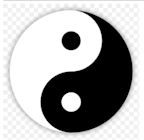
Der Thai Mantak Chia (謝明德, 1944 - ) Universal Healing Tao School in Bangkok.
Abb.: Buchtitel
"Mantak Chia (Chinese: 謝明德, Pinyin: Xiè Míngdé, born in 1944 in Bangkok, Thailand) is a Taoist (道教) Master. He is best known for his teaching Taoist practices under the names of Healing Tao, Tao Yoga, Universal Healing Tao System and Qigong (氣功). Throughout decades of teaching, he has run numerous workshops, written a series of books, and published a number of training videos. For this reason, some people call him an author, a teacher or a healer. He views himself primarily as a teacher, "who helps his students empower themselves through cultivation of their qi (Chinese: 氣,Wade-Giles: ch'i) energy."[1]
BiographyMantak Chia was born to a Chinese family in Thailand in 1944. He was raised in a Christian family. His father was a Baptist minister, breaking with a long tradition of Taoist healer.[2] He began studying Buddhist method of "still the mind" at the age of six, and later he studied Muay Thai boxing (มวยไทย), T'ai chi ch'uan (太極拳), Kung Fu (武術) and Taoist and Buddhist practices, including Zen (禪), from several masters. Of all his masters, the most influential one was Yi Eng (White Cloud), an eremitic member of the Dragon's Gate sect (龙门派) of the Quanzhen (全真道, Complete Perfection) school of Taoism[3][4] (Chinese: 道家全真龙门派), who taught Mantak Chia a complete Taoist training system and authorized him to teach and heal.
Later, he studied Western anatomy and medical science for two years to better understand the physiological mechanisms behind healing energy.
He established his first Universal Healing Tao school in Thailand in 1974, after systematizing his knowledge of Taoism. He founded the Universal Healing Tao Center (originally named the Taoist Esoteric Yoga Center) in New York in 1979. The center attracted a broad variety of European and American students, and some of them greatly helped him in teaching Taoist practices to western students. He returned to Thailand in 1994 and began to build the Universal Tao Training Center—Tao Garden—in Chiang Mai (เชียงใหม่). His primary teaching programs are held in the Tao Garden, but he tours to Europe and North America annually to teach and promote the Healing Tao practices.[5]
He has closely worked with his students with background in Western esoteric studies, such as Michael Winn, Eric Yudelove and Dennis Lewis (เชียงใหม่), to successfully convey the Taoist theories and practices to Western audiences. His ex-wife Maneewan Chia has also co-authored some teaching books."
[Quelle: http://en.wikipedia.org/wiki/Mantak_Chia. -- Zugriff am 2013-04-30]
1974
Das bisher unter Namen wie „All Style Karate“, „Sport-Karate“ oder „Contact-Karate“ bekannte Kickboxen wird zur Wettkampfdisziplin gemacht. Trotz Ähnlichkeiten darf es nicht mit Muay Thai (มวยไทย) verwechselt werden.
1974
Bei Ban Kamala (บ้านกมลา) auf Phuket (ภูเก็ต) wird der vermutlich letzte freilebende Tiger Phukets von Bauern erschossen. Er hatte neunmal Ziegen im Dorf in der Nähe der Schule gerissen.
Abb.: Lage von Ban Kamala (บ้านกมลา)
[Bildquelle: OpenStreetMap. -- Creative Commons Lizenz (Namensnennung, share alike)]
1974
Briefmarken:
1974

Premiere des Schweizer Sexfilms "Heißer Sex in Bangkok" von Erwin C. Dietrich (1930 - )
1974

Die Briten Howard Schaeffer und Gertrude B. Elion (1918 -1999) entwickeln Acyclovir, das erste Arzneimittel gegen ein Virus (Herpesviren). Acyclovir kommt 1982 auf den Markt.
Abb.: In Thailand hergestelltes Acyclovir
1974
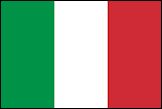
Der italienische Gynäkologe Giorgio Fischer (1934) führt Fettabsaugung (Liposuction) durch.
Abb.: ©Reklame für Liposuction (Fettabsaugung) in Thailand, 2013
[Bildquelle: http://www.liposuctionthailand.net/. -- Zugriff am 2013-10-01. -- Far use]
1974-01
Paramilitärs des Volunteer Defence Corps (Or Sor) (อส. = กองอาสารักษาดินแดน) brandschatzen das Dorf Ban Na Sai (บ้านนาทราย), Provinz Nong Khai (หนองคาย), und töten mehrere Dörfler. Der Angriff gilt vermeintlichen Sympathisanten der Kommunisten.
Abb.: Lage von Ban Na Sai (บ้านนาทราย)
[Bildquelle: OpenStreetMap. -- Creative Commons Lizenz (Namensnennung, share alike)]
1974-01-01

Aus der Neujahrsansprache des Königs:
"The present task that everyone has to undertake is to respond to the crises with strength and equanimity. Full awareness, solidarity and peaceful cooperation will lead us away from disturbances and alleviate the current strife. All parties need to exercise mutual understanding, empathy and sympathy, and to let go of self-interests. Focus on collective interests. Support one another as we have always done. When we unite, there will be great power that will extinguish all the obstacles we face." [Übersetzung: Vasit Dejkunjorn (วสิษฐ เดชกุญชร) <1929 - >: In His Majesty's footsteps : a personal memoir. -- Bangkok : Heaven Lake Press, 2006. -- 307 S. : Ill. ; 23 cm. -- ISBN 978-974-94125-8-9 -- Originaltitel: รอยพระยุคลบาท (2001). -- S. 100]
1974-01-03

USA: Comebackturnee des US-Folk- und Rockmusikers Bob Dylan (1941 - ).
Künstlerlink auf Spotify:
URI: spotify:artist:74ASZWbe4lXaubB36ztrGX
URL: https://open.spotify.com/artist/74ASZWbe4lXaubB36ztrGX
Abb.: Bob Dylan, 1974-02-02
[Bildquelle: Jim McClear. -- http://www.flickr.com/photos/62288765@N00/2255462123. -- Zugriff am 2013-06-04. -- Creative Commons Lizenz (Namensnennung, share alike)]
1974-01-07

Nationalversammlung. Der König klagt, dass in Thailand die Guten nicht die Macht übernehmen wollen, sondern die Bösen. Jetzt sei der Anfang der Demokrastie.
Ein Mitglied des Ausschusses zur Ausarbeitung einer Verfassung sagt: "Das Militär hat die Gewehre und Flugzeuge. Alles, was wir haben, um sie zu stoppen, sind die Verfassung und unser Idealismus."
1974-01-09

Über 5000 protestieren vor der US-Botschaft und fordern die Abberufung des amerikanischen Botschafters, William Roscoe Kintner (1915-1997). Es war bekannt geworden, dass der CIA einen angeblich von einem kommunistischen Aufständischenführer geschriebenen Brief verfasst und an die Thai-Regierung gesandt hatte. In dem Brief wurde ein Waffenstillstand zwischen Guerillas und Thailand vorgeschlagen. Der Chef des Thai Communist Suppression Operations Command, Gen Saiyud Kerdpol (สายหยุด เกิดผล, 1922 - ) verbietet sich alle Einmischungen durch die USA.
"It took less than two months for Ambassador Kintner to fulfill the students prophecy of "intervention", as a widely publicized C.I.A. blunder provided adequate proof that this agency was in fact "meddling" in the affairs of the Thai government. The incident was especially embarrassing to William R. Kintner, who was not only a former U.S. Army Colonel, but also worked for the C.I.A. for two years in Washington. In a rare instance of openness, the U.S. Embassy admitted the C.I.A. involvement and Ambassador Kintner issued an official apology to the Thai government.
The bizarre incident involved a C.I.A. agent whose base of operation was the provincial town of Sakhon Nakhon [สกลนคร
] in Northeast Thailand, an area where communist insurgents have steadily increased their activities in the last five years. The agent apparently sent a phony letter to Prime Minister Sanya Thammasak [สัญญา ธรรมศักดิ์], and several newspapers as well, proposing a cease-fire with the insurgents in exchange for granting autonomy to rebels in Thailand's northeastern provinces. The letter from the C.I.A. agent was sent in the name of the local rebel commander of the estimated 2,000 communist insurgents in Sakhon Nakhon.The C.I.A.'s involvement was revealed by an apparent blunder by a messenger boy who had the letter registered allowing Thai officials to trace it to the C.I.A. office in Sakhon Nakhon. While Ambassador Kintner, in his apology, described the agent's actions as a "regrettable" and "un-authorized initiative", suspicious Thai officials wisely surmised that the letter was designed to assess the new government's response to a cease-fire with the communists. Apparently, the students also realized that the most regrettable aspect of the incident as far as the U.S. Embassy was concerned was the fact that the C.I.A. agent's activities were unfortunately exposed. With the support of most of the Thai language newspapers, the students launched a series of protest activities directed at U.S. intervention in Thai affairs. On January 6, 1974, Thai students laid a wreath in front of the Embassy bearing the slogan "Go home, ugly Americans", while the newspapers carried anti-C.I.A. editorials and cartoons.
Hoping to stem the tide of anti-C.I.A. and anti-American sentiment which was on the rise after the incident. Ambassador Kintner, on January 8th, disclosed that the C.I.A. agent responsible for the letter was transferred out of Thailand, while an embassy spokesman revealed that "appropriate disciplinary action" was being taken. Apparently the students were unimpressed with Kintner's explanation, for on the very next night, January 9th, about 5,000 students protested at the U.S. Embassy grounds, while student leaders attacked the C.I.A. over a public address system outside the embassy gates. More important, several days after the C.I.A. incident, senior Thai officials revealed that the C.I.A. would be told to close its field posts and stay out of Thailand's internal affairs.
Previously, the C.I.A. had enjoyed Thai government cooperation for most of their clandestine activities. Operating out of the political section on the fourth floor of the U.S. Embassy under the agency's Plans Directorate, the department became known as the "dirty tricks department." The C.I.A. operation in Thailand has been one of the largest overseas operations and one of the most effective in cultivating an exceptionally close relationship with the former Thai Prime Minister, Thanom Kittikachorn [ถนอม กิตติขจร]. According to informed Thai sources, the relationship was so close that Thanom often made himself much more available to the C.I.A. chief than to the U.S. Ambassador."
[Quelle: Prizzia, Ross ; Narong Sinsawadi: Thailand : student activism and political change. -- Bangkok : D. K. Book House, 1974. -- S. 159ff.]
1974-01-10
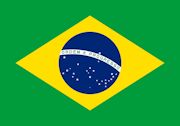
Die Polizei nimmt einen brasilianischen Touristen fest, der mit nacktem Oberkörper vor dem Dusit Thani Hotel spazieren geht. Der Tourist sagt: "I am a tourist and I do not see why it is necessary to know Thai law. I have the right to do anything which suits me."
Abb.: Lage von Brasilien
[Bildquelle: OpenStreetMap. -- Creative Commons Lizenz (Namensnennung, share alike)]
1974-01-10

Medizinische Hilfe durch US-Militär:
Abb.: "Bong Son Village, Thailand. First Lieutenant Linda J. Bowser, an Air Force nurse with the 8th TFW Med-Cap team, examines a Thai girl."
[Bildquelle: Wikimedia. -- Public domain]
1974-01-17

Der japanische Ministerpräsident Kakuei Tanaka (田中 角榮, 1918 - 1993) kommt nach Bangkok. Er erhält von der Regierung einen ausgesprochen kühlen Empfang. In Bangkok erwarten ihn 5000 Demonstranten, meist Studenten. Sie beschuldigen Japan der Ausbeutung Thailands.
Abb.: Kakuei Tanaka (田中 角榮), 1973
[Bildquelle: Wikimedia. -- Public domain]
Abb.: Lage von Japan
[Bildquelle: OpenStreetMap. -- Creative Commons Lizenz (Namensnennung, share alike)]
"During the same tumultuous weeks of the C.I.A. incident, thousands of Thai students gave Japanese Prime Minister Tanaka [田中 角榮
] a hostile reception as he arrived in Bangkok for a two- day visit. The students massed outside Tanaka's hotel and blocked all the entrances with buses and demanded that Tanaka leave the country immediately. They withdrew that threat and moved the buses only after Japan's ambassador accepted a list of demands from them. These demands included that:
- all Japanese loans to Thailand be without conditions.
- Japan lift its import quotas on Thai products.
- the Japanese government train all prospective Japanese investors in Thailand in Thailand's needs, tradition, and culture.
Thereafter, the students allowed Tanaka to leave his hotel, but as he left they beat on his limousine and shouted "Japanese go home." Interestingly enough, the police did not interfere, and only student marshals with red arm-bands held back the noisy crowd of students who began burning paper effigies (i.e., Japan-made cars) in front of the Japanese-Trade Center nearby."
[Quelle: Prizzia, Ross ; Narong Sinsawadi: Thailand : student activism and political change. -- Bangkok : D. K. Book House, 1974. -- S. 161.]
1974-01-17

Ministerpräsident Sanya zitiert US Botschafter William Roscoe Kintner (1915– 1997) wegen der CIA-Affäre von 1973-12 zu sich.
"On January 17, Kintner was called to Government House to explain to the Prime Minister the role of the CIA in Thailand. At that meeting, Kintner pledged to Sanya that he would do everything possible to prevent any U. S. interference in Thailand’s internal affairs; the CIA office from which the letter had been sent, he also indicated, had been closed and the agent responsible returned to the United States. Kintner’s assurances were accepted at face value, but the incident left a bad taste in the mouth of those already concerned with the broad scope of American involvement in Thailand." [Quelle: Randolph, R. Sean: The United States and Thailand : alliance dynamics, 1950-1985. -- Berkeley : Institute of East Asian Studies, University of California, 1986. -- 245 S. ; 23 cm. -- (Research papers and policy studies, 12). -- ISBN 0-912966-92-0. -- S. 170]
1974-01-17

Der US-Ingenieur Nathaniel C. Wyeth (1911 - 1990) meldet Polyethylenterephthalat (PET, C10H8O4) als Patent an. Daraus werden recycelbare PET-Flaschen hergestellt.
Abb.: Kennzeichen
Abb.: PET-Flaschen, Thailand, 2013
[Fair use]
1974-01-20

Erstflug des US-Mehrkampfjet General Dynamics F-16 Fighting Falcon. Indienstnahme ab 1978-08. Die Royal Thai Airforce wird über 30 Exemplare in Dienst nehmen.
Abb.: General Dynamics F-16 Fighting Falcons der Royal Thai Airforce, 2009
[Bildquelle: Melani R. Stemmler, U.S. Marine Corps / Wikimedia. -- Public domain]
1974-01-24
Thai Border Patrol Police und Dorfverteidigungs-Freiwillige plündern und brandschatzen das Dorf Ban Na Sai, Provinz Nong Khai (หนองคาย). Sie ermorden vier Personen, darunter ein Kind. Die Polizei behauptet, die Täter wären kommunistische Aufständische gewesen.
Armeechaf Gen Kris Sivara (กฤษณ์ สีวะรา) verspricht, das Dorfverteidigungs-Freiwilligen-Corps aufzuräumen. Bestraft wird niemand.
1974-02 - 1974-05
Democracy Propagation Program.
"The Democracy Propagation Program was conceived by Prime Minister Sanya soon after he assumed office in late 1973. Sanya believed that the new constitution by itself would be inadequate to help the people understand their roles as public citizens. He contended that a massive political education program would greatly benefit the rural populace whose experience with self-government was so limited. The program was initially administered by a national committee composed of prominent individuals from various professions. Its secretariat of about forty was run by a group of intellectuals and students and began to operate in February 1974 with offices in Government House, and a budget of 3 million baht. The program published pamphlets, posters, and movies depicting people’s rights and duties in a democratic system and urging them to participate in elections. The movies were shown on nationwide television. Slide shows were presented in village as well as urban schools.
The national committee selected about 300 students for intensive orientation and special training. These students were sent to conduct feasibility studies in various parts of the country. Their studies were then used to select certain districts in which extensive programs were to be implemented. Local secondary school students were also involved in the democracy propagation effort.
In April 1974, the state universities bureau launched a second Democracy Propagation Program with a government grant of 12 million baht. The program, subtitled "Return to Rural Areas," involved 3000 students, 80 percent of them from teacher-training colleges and the rest university students. Unlike the first program, which operated in only about fifty priority districts, the State Universities Bureau sent students to all 580 districts.
Although thousands of students from all over the country participated in this effort, on the whole it was far from a great success. Most students were still confused about the meaning of democracy, particularly as it applied to remote villages. Frequently they talked with great emotion about broad social issues, which most villagers could not understand and did not really care about: socialism, CIA, KGB, power-to-the-people, and so on. While the villagers were concerned with day-to-day realities, the students spoke in terms of vague, confusing theories. Often the students did not take enough time to listen to the villagers, to understand their own specific local problems. As one journalist observed,
"They went out to lecture, not to help."
When they discovered a specific incident of corruption or of an exploitative landlord, their tendency was to blow it up all out of proportion.
Perhaps the most significant consequence of this program was to give the students a tremendous experience with rural life, a shock-treatment exposure to the farmers’ true living conditions. The students learned far more from the villagers than vice versa. Many were radicalized, becoming increasingly dissatisfied with the structure of government in Thailand and with the Bangkok establishment from which many of them came.
Some of the students did remarkable work. Those who were pragmatic, who listened, who exercised common sense, made a great impact in the areas they visited. Instead of teaching the farmers about the democratic system of government, they mobilized farmers to political action. They showed them what could be done, and how to take the first steps. Since there were no elected members of parliament during this period, the students were acting as the only brokers for the farmers’ grievances. Table 6.1 [s. unten] summarizes the rural problems identified by the students during their village visits, as presented at a seminar at the formal conclusion of the Democracy Propagation Program in May 1974. If nothing else, they certainly were exposed to the realities of life facing the mass of the country's citizens."
[Quelle: Morell, David ; Chai-anan Samudavanija [ชัยอนันต์ สมุทวณิช] <1944 - >: Political conflict in Thailand : reform, reaction, revolution. -- Cambridge, Mass. : Oelgeschlager, 1981. -- 362 S. : Ill. ; 24 cm. -- ISBN 0-89946-044-5. -- S. 151 - 154. -- Fair use]
Resumé der Studenten, die am Democracy Propagation Program von März bis Mai 1974 teilgenommen haben:
"Problems in Rural Areas Identified by Students During the Democracy Propagation Program, March-May 1974 power
- Political Problems
- Gap between government bureaucrats and rural people
- Corruption
- Bureaucratic inefficiency and lack of justice in government administration
- Lack of bureaucrats’ knowledge of and concern over the people’s welfare
- Too much centralization of government decisionmaking
Inadequate maintenance of law and order
- Inadequate police protection
- Prevalence of burglary
- Gaps between police officers and the people
- Abuse of the law by some police officers
- Difficulties with armed minority groups
Communist insurgency
- Some villagers believe in and support communism
- Some people have been mistreated and unfairly accused of being communists
- Poverty contributes to the decisions of some to turn to the communists
- People in some areas get their information only from the CPT [Communist Party of Thailand]
Influential local groups
- Local elites have too much influence over local politics and administration
- Some local leaders intimidate ordinary people
- Misconduct by members of volunteer defense units
Low level of villager political interest
- Little interest in elections
- People are more concerned with their personal livelihood than politics
- Past behavior of MPs has discouraged many people
- Lack of interest aggregation mechanisms; few organized interest groups
Economic Problems
- Poor standard of living
- High prices for food and other commodities
- Low levels of income
- Underemployment
- Lack of capital to purchase items needed for agricultural production
- Land ownership
- Barren, unproductive land
- Farmers’ ignorance about modern techniques of cultivation
- Indebtedness
- High interest rates on loans
- High rents for farm land
- Water supply
- Lack of adequate irrigation facilities
- Loose sandy soil that does not hold enough water
- Communications
- Many roads are impassable in the rainy season
Social, Educational, and Public Health Problems<
- Education
- Rural people are uneducated
- Shortage of schools, teachers, school equipment
- Social structure
- Inadequate promotion and support of Thai customs and culture
- Excessive influence of western cultural patterns
- Deteriorating religious beliefs
- Inappropriate conduct of some monks
- Health
- Lack of adequate sanitary and public health facilities"
[Übersetzt in: Morell, David ; Chai-anan Samudavanija [ชัยอนันต์ สมุทวณิช] <1944 - >: Political conflict in Thailand : reform, reaction, revolution. -- Cambridge, Mass. : Oelgeschlager, 1981. -- 362 S. : Ill. ; 24 cm. -- ISBN 0-89946-044-5. -- S. 153f.]
1974-02

In สังคมศาสตร์ปริทัศน์ = Social Science Review berichtet ein früherer Angestellter von ARPA (Advanced Research Projects Agency), wie von den USA finanzierte Forschung im ländlichen Raum Thailands - vor allem mit Hilfe junger Thais - zu Spionagezwecken genutzt wird.
1974-02-07

Verteidigungsminister Thawee Junlasap (พลอากาศเอก ทวี จุลละทรัพย์, 1914 - 1996) trifft in Beijing (北京) zu einem einwöchigen Besuch ein als Chef des thailändischen Olympischen Kommitees.
1974-02-08
Premiere des Films The Colonel (ผมไม่อยากเป็นพันโท) von Prinz Chatrichalerm Yukol (หม่อมเจ้าชาตรีเฉลิม ยุคล, 1942 - )
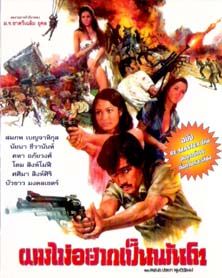
Abb.:
DVD-Titel
[Bildquelle: Wikipedia. -- Fair use]
|
"The Colonel (Thai: ผมไม่อยากเป็นพันโท, Pom Mai Yak Pen Pan To, literally "I don't want to be a lieutenant colonel") is a 1974 Thai action-thriller film directed by Chatrichalerm Yukol (หม่อมเจ้าชาตรีเฉลิม ยุคล, 1942 - ). PlotThe story follows the exploits of a Thai intelligence officer who must assume the identity of a slain lieutenant colonel in a neighboring country's military who was working as a double agent. Cast
[Quelle: http://en.wikipedia.org/wiki/The_Colonel_%281974_film%29. -- Zugriff am 2013-04-20] |
1974-02-11

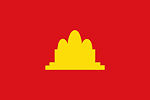
Die Roten Khmer (ខ្មែរក្រហម) greifen Phnom Penh (ភ្នំពេញ) in Kambodscha schwer an.
Abb.: Lage von Phnom Penh (ភ្នំពេញ)
[Bildquelle: OpenStreetMap. -- Creative Commons Lizenz (Namensnennung, share alike)]
1974-02-12
Nach dem Tod ihres Entdeckers des Thai-Biologen Kitti Thonglongya (กิตติ ทองลงยา, 1978 - 1974-02-12) beschreibt sein Forschungspartner John E. Hill die Schweinsnasenfledermaus (Craseonycteris thonglongyai). Sie wurde im Tal des Kwae Noi (แม่น้ำแควน้อย) gefunden. Mit einer Kopfrumpflänge von 29 bis 33 Millimeter und ein Gewicht von 1,7 bis zwei Gramm ist es das kleinste bekannte Säugetier.
Abb.: Schweinsnasenfledermaus (Craseonycteris thonglongyai) (ausgewachsenes Tier)
[Bildquelle: th. Wikipedia. -- Public domain]
1974-02-18

Abkommen mit der Bundesrepublik Deutschland über die Entsendung deutscher Entwicklungshelfer.
1974-02-24
Bangkok Post: Artikel von Thirayuth Boonmee [ธีรยุทธ บุญมี, 1950 - ]
"The Ban Na Sai [บ้านนาทราย, s. oben] incident had a great impact on Thirayut Boonmi [ธีรยุทธ บุญมี, 1950 - ] and a number of other student activists. Thirayut had predicted early on that the government’s decision on this incident would be an important indicator of the nation’s political direction. After the incident, he and other students became much more radical, fed up with the establishment for its willingness to tolerate such behavior by government forces. In a newspaper article, Thirayut pointed out that the rural people continued to be treated badly by the Bangkok regime, while most people in the capital area were indifferent to the suffering of rural villagers. He concluded by saying that: The time is up for us to compromise with those narrow minded people who are protecting their own interests, and with those who are afraid of change. This [incident] is proof that it’s about time for us to stop working just to please the privileged class. This is the basic challenge to those of us who fought in the October 1973 revolution. It indicates that the path to the people’s happiness is still far away, and hazardous."
[Quelle: Morell, David ; Chai-anan Samudavanija [ชัยอนันต์ สมุทวณิช] <1944 - >: Political conflict in Thailand : reform, reaction, revolution. -- Cambridge, Mass. : Oelgeschlager, 1981. -- 362 S. : Ill. ; 24 cm. -- ISBN 0-89946-044-5. -- S. 171f.]
1974-02-27
Die Bangkok Post berichtet über Gräueltaten des ISOC's [Internal Security Operations Command - กองอำนวยการรักษาความมั่นคง ภายในราชอาณาจักร] in Amphoe Na Kae (นาแก):
Abb.: Lage von Amphoe Na Kae (นาแก)
[Bildquelle: OpenStreetMap. -- Creative Commons Lizenz (Namensnennung, share alike)]
"The villagers were tortured with the males getting their genitals burned and the females being raped." [Zitiert in: Morell, David ; Chai-anan Samudavanija [ชัยอนันต์ สมุทวณิช] <1944 - >: Political conflict in Thailand : reform, reaction, revolution. -- Cambridge, Mass. : Oelgeschlager, 1981. -- 362 S. : Ill. ; 24 cm. -- ISBN 0-89946-044-5. -- S. 170]
1974-03
Bauern demonstrieren für höhere Reispreise. Ihr Anführer ist Chai Wangtaku (ใช่ วังตะกู), ein Bauer aus Phitsanulok (พิษณุโลก).
1974-03
Ministerpräsident Sanya in Sithiseriphap 1 (สิทธิเสรีภาพ):
"I never thought the hardship of the people would be this much. I saw it when I accepted the responsibility for administration of the country. I am of the opinion that it is the duty of everyone to help the people to have a better life, especially resolving the big gap between the rich and the poor, which must be reduced by helping the poor to improve their living conditions. The sooner that this is done, the more advanced the country will become." [Übersetzung zitiert in: Morell, David ; Chai-anan Samudavanija [ชัยอนันต์ สมุทวณิช] <1944 - >: Political conflict in Thailand : reform, reaction, revolution. -- Cambridge, Mass. : Oelgeschlager, 1981. -- 362 S. : Ill. ; 24 cm. -- ISBN 0-89946-044-5. -- S. 3]
1974-03-02
Premiere des Films Hotel Angel (เทพธิดาโรงแรม) von Prinz Chatrichalerm Yugala (หม่อมเจ้าชาตรีเฉลิม ยุคล, 1942 - )
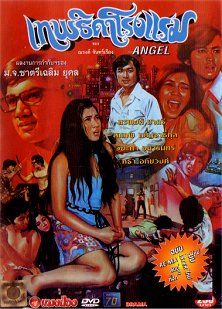
Abb.: Plakat
|
"Hotel Angel (Thai: เทพธิดาโรงแรม, or Theptida rong ram, also known as Angel) is a 1974 Thai drama film directed by Chatrichalerm Yukol (หม่อมเจ้าชาตรีเฉลิม ยุคล, 1942 - ), about a young woman (Viyada Umarin - วิยะดา อุมารินทร์, 1955 - ) who becomes involved in the sex trade in Bangkok. PlotMalee is a farm girl from Northern Thailand who decides to sneak away to Bangkok with her boyfriend, Chate, but shortly after arriving, Chate disappears and Malee finds herself held captive in a "love hotel". To pay for the room, she is forced to sleep with men. At first, she is horrified by what she must do, but after a time, she becomes resigned and accepts her situation as fate. With her debt paid, she starts to earn money working as a prostitute, giving her the ability to buy new clothes and send money home to her father, telling him she is working as a seamstress. As Malee is taking her clothes off, her father is putting new windows on his house. Malee gains a reputation in her community as a person to be relied upon to help break new girls in. One particularly hard case refuses to be accepting as Malee was, and despite Malee's advice continues to be rebellious and eventually commits suicide. Even after the death of her charming pimp (Sorapong Chatree - สรพงษ์ ชาตรี, 1950 - ), Malee continues until one day she is able to become independent of the sex trade. The ending is ambiguous. After being chatted up by a man, she runs to a shop to buy jeans and a shirt. Having put on these new clothes, she throws her old working clothes away and walks away. Cast
A DVD of the film was released in Thailand on an all-region, PAL disc, with English language subtitles, by the Mangpong retail video chain." [Quelle: http://en.wikipedia.org/wiki/Hotel_Angel. -- Zugriff am 2013-03-18] |
1974-03-05
Akom Suwannop (อาคม สุวรรณนพ) in Prachapathipatai (ประชาธิปไตย):
"After we united to get rid of the three tyrants, was there any change in the evil structure of our society? No, not at all. The tools and instruments or mechanisms which produce grievances to the people are still intact, conducive to tyranny. Even though we have a new government, it still continues with the same old policy as the three tyrants. So what good did it do to have a new government?" [Übersetzung zitiert in: Morell, David ; Chai-anan Samudavanija [ชัยอนันต์ สมุทวณิช] <1944 - >: Political conflict in Thailand : reform, reaction, revolution. -- Cambridge, Mass. : Oelgeschlager, 1981. -- 362 S. : Ill. ; 24 cm. -- ISBN 0-89946-044-5. -- S. 3]
1974-03-08
Vor dem Parlament demonstriert die Women's Liberation Front, eine Gruppe von ca. 20 Frauen. Sie fordern Gleichberechtigung der Frauen. Die Sprecherin, Veena Simtrakrew sagt, dass die Frauen nicht mehr länger die Hinterbeine des Elefanten sein wollen.
1974-03-27
Die Thai-Marine erhält ihr neues Flaggschiff "Makut Rajakumarn". Das in Großbritannien gebaute Schiff ist das erste Schiff der Thai-Marine, das mit Boden-Luft-Raketen ausgestattet ist.
Name: HMTS Makut Rajakumarn Operator: Royal Thai Navy Builder: Yarrow Shipbuilders, Glasgow Launched: 18 November 1971 Commissioned: 7 May 1973 Status: in service as a taining ship (2010) General characteristics Type: frigate Displacement: 1,650 tons standard, 1,900 tons full load Length: 97.6 m Beam: 10.97 m Draught: 5.5 m Propulsion: 2 shaft CODOG
1 Rolls-Royce Olympus gas turbine 19,500 hp
1 Crossley Pialstick diesel 6000 hpSpeed: 26 knots (18 knots diesels only) Range: 5000 NM - at 16 knots
1200 NM at 26 knotsCrew: 140 Sensors and
processing systems:Radar - HSA LW-04, HSA WM-22, Decca 626
Sonar 170B, 162, Plessey M27Armament:
- Anti-aircraft missile (1x4) Sea Cat (later removed);
- 2 4.5 in Mk 8 guns
- 2 x 40 mm Bofors AA guns (2x1)
- 1 Limbo anti submarine mortar (later removed)
- 2 x 3 anti-submarine torpedo tubes (added in 1988 replacing Limbo)
[Quelle der Tabelle: http://en.wikipedia.org/wiki/HTMS_Makut_Rajakumarn. -- Zugriff am 2011-11-21]
1974-03-29
Claudia Ross, Reporterin der Bangkok Post, wird in ihrer Wohnung ermordet. Ihr letzter Artikel war über die religiöse US-Bewegung Children of God in Thailand. Der Mord wird nie aufgeklärt.
Abb.: Schlagzeilen ihres letzten Artikels
[Bildquelle: Chronicle of Thailand : headline news since 1946 / ed. in chief Nicholas Grossman. -- Bangkok : Bangkok Post, 2010. -- ISBN 978-981-4217-12-5.-- S. 197. -- Fair use]
1974-04-06
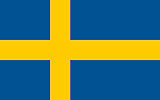
Die schwedische Popgruppe ABBA gewinnt den Grand Prix d'Eurovision de la Chanson. Dies ist der Beginn ihrer internationalen Karriere.
Die Gruppe auf Spotify:
URI: spotify:artist:0LcJLqbBmaGUft1e9Mm8HV
URL: https://open.spotify.com/artist/0LcJLqbBmaGUft1e9Mm8HV
Abb.: ABBA, 1974
[Bildquelle: Beeld en Geluidwiki / Wikipedia. -- Creative Commons Lizenz (Namensnennung, share alike)]
1974-04-07
Tod von Thep Chotinuchit, 67, Vorsitzender der United Economist Front Party. Thep hatte versucht, die verschiedenen sozialistischen Kräfte in Thailand zu vereinigen. Er saß über 8 Jahre im Gefängnis, da er als Kommunist gebrandmarkt wurde.
1974-04-13
Tod des sozialkritischen Schriftstellers Thawi Ketuwandi (ทวี เกตะวันดี) aka. Rom Ratiwan (รมย์ รติวัน) (1932 - 1974)
Abb.: Einbandtitel Gedenkbuch für Thawi Ketuwandi (ทวี เกตะวันดี)Pseudonyme:
- รมย์ รติวัน
- รอย ฤทธิรณ
- เครียว คนกลางคืน
- แชน อรชุน
- "แคน"
- "ดาวสีฟ้า"
- เคน คนนา
- บุษบา เริงชัย
"Als wichtigster Repräsentant dieser literarischen Richtung während der Sarit-Ära ist Rom Ratiwan [รมย์ รติวัน] (1932-73) (Pseudonym von Thawi Ketuwandi [ทวี เกตะวันดี]) zu betrachten, der, aus der notorischen Armutsregion des thailändischen Nordostens stammend, wie viele seiner Autorenkollegen auch, beruflich als Journalist in Bangkok tätig war und hier mit dem oben erwähnten Itsara Amantakun [อิศรา อมันตกุล, 1921 - 1969] befreundet war. Zusammen mit Lau Khamhom [ลาว คำหอม] (Khamsing Sinog [คำสิงห์ ศรีนอก]) (geb. 1930), der zu Beginn der Sarit-Zeit ebenfalls noch mit einigen sozialkritischen Kurzgeschichten hervorgetreten war und einigen anderen Schriftstellern schloß Rom sich zu einer Literatengruppe zusammen, die mit den von ihr herausgegebenen Zeitschriften Sai Than (1958) und Khwan Cai (1962) - soweit dies unter den restriktiven Bedingungen jener Jahre überhaupt möglich war - der engagierten Literatur eine Heimstatt zu geben suchte. Diesen Bestrebungen wurde jedoch schon bald von den staatlichen Kontrollorganen in ihrem Vernichtungsfeldzug gegen jegliche linker Tendenz verdächtigte Aktivitäten ein Ende gesetzt. Aufgrund seiner für die Armen und Unterprivilegierten Partei ergreifenden Kurzgeschichten aus der Sarit-Ära und den darauffolgenden Jahren, zu denen noch der vor dem Oktober 1973 abgeschlossene und 1980 posthum veröffentlichte Roman 'Thon Thewada' [โทนเทวดา] hinzukommt, gelangte Rom Ratiwan bei den jungen Lesern und Autoren nach dem Oktober 1973 zu großem Ansehen als vorbildlicher Repräsentant der 'Literatur für das Leben'. Charakteristisch für die ihm in dieser Zeit nach einigen Jahren der Vergessenheit wieder entgegengebrachte Wertschätzung ist das Vorwort zu einer 1976 erschienenen Sammlung von Kurzgeschichten aus seiner Feder, in dem es heißt, er habe als Autor unwandelbar an der Seite der Armen und Elenden gestanden und weiter: "Rom Ratiwans gesamtes Werk enthüllt dem Leser Benachteiligung und Ungerechtigkeit in der Gesellschaft. Jeder Buchstabe vom ihm gleicht einem für die Unterdrückten erhobenen Ruf nach dem, was ihnen zusteht. "
Ein Autor wie Rom Ratiwan war jedoch während der Sarit-Ära, als beispielsweise auch die thailändische Übersetzung von Gorkis [Максим Горький, 1868 - 1936] 'Mutter' [Мать, 1907] zu den verbotenen Büchern gehörte, eine. Ausnahmeerscheinung. Seine gesellschaftliche Missstände angreifenden Kurzgeschichten ändern nichts daran, dass die thailändische Literatur in der Zeit von 1958 bis zum Beginn der siebziger Jahre aufs Ganze gesehen, ähnlich wie schon in der Zeit vor 1950, darauf hin angelegt war, den Leser von der Realität der staatlich-gesellschaftlichen Zustände abzulenken und mit banalen Liebes-, Abenteuer- und Gespenstergeschichten sowie mit ’sex and crime' zu zerstreuen. In der vorzugsweise mit Personen aus den 'höheren Ständen' bevölkerten Scheinwelt, in die insbesondere die Romane dieses Zeitraumes die Phantasie des Lesers entführten, war für die Angehörigen der arbeitenden Klassen kaum Platz. Soweit sie in dieser Art von Literatur überhaupt vorkamen, erschienen sie meist in einem wenig günstigen Licht: Typische Figuren waren hier der dumme, unwissende und einfältige Bauer, der bösartige, unbeherrschte und gewalttätige Arbeiter sowie neugierige und klatschsüchtige Hausangestellte."[Quelle: Rosenberg, Klaus <1943 - 1988>: Sozialkritische Literatur in Thailand : Protest und Anklage in Romanen und Kurzgeschichten eines Landes der Dritten Welt. -- Hamburg : Ges. für Natur- u. Völkerkunde Ostasiens, 1986. -- 360 S. ; 21 cm. -- (Gesellschaft für Natur- und Völkerkunde Ostasiens: Mitteilungen der Gesellschaft für Natur- und Völkerkunde Ostasiens e.V. Hamburg ; Bd. 101). -- S. 58f.]
1974-04-19
Gründung des Tarutao National Marine Park (อุทยานแห่งชาติทางทะเลตะรุเตา).
Abb.: Lage des Tarutao National Marine Park (อุทยานแห่งชาติทางทะเลตะรุเตา)
[Bildquelle: OpenStreetMap. -- Creative Commons Lizenz (Namensnennung, share alike)]
Abb.: Tarutao National Marine Park (อุทยานแห่งชาติทางทะเลตะรุเตา)
[Bildquelle: DUFFEY Thibaud / Wikimedia. -- GNU FDLicense]
1974-04
In Thailand wird für den James-Bond-Film "The man with the golden gun" gefilmt. Um die Insel Ko Khao Phing Kan (เกาะเขาพิงกัน) halten über 50 Polizisten in Booten neugierige Touristen fern.
Abb.: Lage von Ko Khao Phing Kan (เกาะเขาพิงกัน)
[Bildquelle: OpenStreetMap. -- Creative Commons Lizenz (Namensnennung, share alike)]
Abb.: Filmplakat
[Bildquelle: Wikipedia. -- Fair use]
"On 6 November 1973 filming commenced at the part-submerged wreck of the RMS Queen Elizabeth, which acted as a top-secret MI6 base grounded in Victoria Harbour in Hong Kong (香港).[34] The crew was small, and a stunt double was used for James Bond. The major part of principal photography started in April 1974 in Thailand.[17] Thai locations included Bangkok, Thon Buri (ธนบุรี), Phuket (ภูเก็ต) and the nearby Phang Nga (พังงา) Province, on the islands of Ko Khao Phing Kan (เกาะเขาพิงกัน) and Ko Tapu ( เกาะตะปู).[35][21] Scaramanga's hideout is on Ko Khao Phing Kan, and Ko Tapu is often now referred to as James Bond Island both by locals and in tourist guidebooks.[36] The scene during the boxing match used an actual Muay Thai (มวยไทย) fixture at the Lumpinee Boxing Stadium (สนามมวยเวทีลุมพินี).[21] In late April, production returned to Hong Kong, and also shot in Macau,[17] as the island is famous for its casinos, which Hong Kong does not have.[15] As some scenes in Thailand had to be finished, and also production had to move to studio work in Pinewood Studios—which included sets such as Scaramanga's solar energy plant and island interior—cinematographer Ted Moore became ill and Academy Award winner Oswald Morris was hired to finish the job.[37] Morris was initially reluctant, as he did not like his previous experiences taking over other cinematographers' work, but accepted after dining with Broccoli.[38] Production wrapped in Pinewood in August 1974.[15]"
[Quelle: http://en.wikipedia.org/wiki/The_Man_with_the_Golden_Gun_%28film%29#Filming. -- Zugriff am 2011-11-22]
1974-05-01
Erste öffentliche Homo-Ehe in Thailand: ein Mann heiratet einen Transsexuellen (Kathoey - กะเทย). Die Ehe ist allerdings nicht rechtsgültig.
1974-05-21
Ministerpräsident Sanya und seine Minister treten zurück. Der König ernennt am 28. wieder Sanya zum Ministerpräsidenten, der eine neue Regierung bildet.
1974-05-21
Die Zeitung บ้านเมือง (Ban Muang):
"Even the CIA would not object to Kukrit [Kukrit Pramoj คึกฤทธิ์ ปราโมช, 1911 - 1995] as a Prime Minister!" [Übersetzt in: Luther, Hans Ulrich <1940 - >: Peasants and state in contemporary Thailand : from regional revolt to national revolution?. -- Hamburg : Institut für Asienkunde, 1978. -- 109 S. ; 21 cm. -- (Mitteilungen des Instituts für Asienkunde, Hamburg ; Nr. 98). -- ISBN 3-921469-49-X. -- S. 32. -- Fair use]
1974-05-22

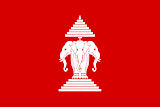
Die letzten Thai-Freiwilligen-Truppen werden aus Laos abgezogen. 758 Personen gelten als in Laos verschollen. 150 davon werden als Gefangene 1972-09-19 freigelassen. Der Rest gilt vorwiegend als gefallen.
1974-05-22

Der König fährt per Zug nach Nakhon Si Thammarat (นครศรีธรรมราช). Er verwendet kein Flugzeug wegen des hohen Benzinpreises.
Abb.: Eisenbahnlinie nach Nakhon Si Thammarat (นครศรีธรรมราช)
[Bildquelle: OpenStreetMap. -- Creative Commons Lizenz (Namensnennung, share alike)]
1974-05-27 - 1975-02-15
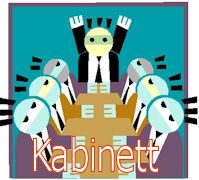
34. Kabinett: Sanya (สัญญา) II
1974-06 - 1974-09
Staatliches Komitee zur Schlichtung von Streitigkeiten zwischen Bauern und Landbesitzern sowie Geldverleihern. Beim Komitee gehen 53.650 Petitionen von Bauern ein, die sich von Landbesitzern und Wucherern um Land betrogen ansehen. Das Komitee schlichtet nur 1635 Fälle, wobei 40.000 Rai Land an Bauern zurückgegeben werden. Die restlichen Petitionen werden ad acta gelegt.
1964-06
In neun Provinzen sind in den letzten sechs Monaten schätzungsweise 12.000 Eingaben eingegangen zum Landbesitz von ca. 213.000 Rai (341 km²) Nassreisfeldern
1974-06
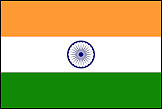
Der indische Film Haathi mere saathi (हाथी मेरे साथी) ("Mein Freund der Elefant" - ช้างเพื่อนแก้ว) wird ein Kassenschlager. Er spielt über 10 Mio Baht ein.
Abb.: Filmplakat
[Bildquelle: th.Wikipedia. -- Fair use]Soundtrack auf Spotify:
URI: spotify:album:42WHSMp5qVfd65fkNHsLML
URL: https://open.spotify.com/album/42WHSMp5qVfd65fkNHsLML
"Haathi Mere Saathi is an Indian film and a favourite with children in the early 1970s. The movie has a Disneyesque appeal with an Indian twist. Haathi Mere Saathi was the biggest hit of 1971 going by box office collections eclipsing the Raj Khosla-made Mera Gaon Mera Desh and was critical acclaimed film. Rajesh Khanna (ਰਾਜੇਸ਼ ਖੰਨਾ) was the biggest star of that period, and Haathi Mere Saathi ranks high among the biggest -ever hits of his career. But the film ranks as a classic because it is still unequalled as the complete family fare in its genre for kid.[1]Haathi Mere Saathi, at that point of time, was the biggest hit ever made by a South producer in Hindi. [2] The story was written by producer ‘Sandow’ M.M.A.Chinappa Devar, who overviewed the film and played a small cameo in it. Directed and edited by his brother M.A.Thirumugham, it had screenplay by Salim-Javed, dialogues by Inder Raj Anand, music by Laxmikant-Pyarelal and lyrics by Anand Bakshi. The film was also the first collaboration of Salim-Javed, who were officially credited as screenplay writers.[3]
PlotOrphaned Raju, in the company of four elephants, has to perform with them at street corners, in order to keep alive. The back-story is that as an orphan, they have saved his life from a leopard. In time, he makes it big, and starts Pyar Ki Duniya (The World Of Love), a zoo in which various wild animals reside along with his elephants, among whom Ramu is closest to him. Slowly he amasses a fortune, and is able to build his own private zoo, housing tigers, lions, bears, and of course the four elephants. He treats all the animals as his friends. He meets with Tanu, and both fall in love. Tanu's dad, Ratanlal, is opposed to this alliance, but subsequently relents, and permits the young couple to get married. He falls in love with Tanu (Tanuja - तनुजा समर्थ), but her rich dad (Madan Puri) agrees to their marriage only after some persuasion. However trouble looms soon after as Tanu feels neglected. Things worsen when their child is born, and Tanu, fearing physical harm to her child from the elephants, tells Raju to choose between the elephants and his family. Tanu is unhappy with the amount of time Raju spends with his animal friends, and this causes some bitterness between them. Things do not improve when a child is born, as Tanu fears that one day the child will be harmed by one of the animals, and hence Raju is told to make a choice between his animal friends or his wife and son. When Raju chooses his lifelong friends over wife and son, Ramu decides to bring the estranged couple together, but thanks to the villainous Sarwan Kumar (K.N.Singh), he has to sacrifice his life."
[Quelle: http://en.wikipedia.org/wiki/Haathi_Mere_Saathi. -- Zugriff am 2011-11-22]
1974-06-03
Der Generalsekretär des National Student Center of Thailand (NSCT, ศูนย์นิสิตนักศึกษาแห่งประเทศไทย) übergibt Ministerpräsident Sanya eine große Anzahl von Petitionen von Bauern gegen Wucherer. In den Dokumenten werden die Wucherer namentlich genannt.
1974-06-03

Air America, die Luftlinie des CIA, behauptet, dass sie alle Operationen von Thailand aus beendigt und Ausrüstung im Wert von 4 Milliarden Baht Thai Airways International übergeben wird. Air America hatte über 250 amerikanische Beschäftigte auf ihrem Stützpunkt in Udon Thani (อุดรธานี).
Abb.: Lage von Udon Thani (อุดรธานี)
[Bildquelle: OpenStreetMap. -- Creative Commons Lizenz (Namensnennung, share alike)]
Abb.: "An "Air America" Helio U-10D Courier aircraft (s/n B-845?) in Laos on a covert mountaintop landing strip (LS) "Lima site".", 1970
[Bildquelle: Dr. B. R. Lang / Wikimedia. -- Public domain]
Abb.: Flugzeug-Landeplätze in Laos
[Bildquelle: CIA. -- Public domain]
"Air America war eine US-amerikanische Fluggesellschaft, die von der CIA kontrolliert wurde und verdeckte Operationen in Südostasien während des Vietnamkriegs durchführte. Nach außen hin trat sie dabei als zivile Fluggesellschaft auf. Geschichte
Hervorgegangen ist die Fluggesellschaft aus der Civil Air Transport (CAT), die im Besitz von Claire Lee Chennault Nachschubflüge an die chinesische Front im Zweiten Weltkrieg durchgeführt hatte. Als dem Unternehmen in der Nachkriegszeit der Bankrott drohte, wurde es als Tarngesellschaft 1949 von der CIA angekauft. Dazu wurde die Firma American Airdale Corporation in Delaware gegründet. Zum 7. Oktober 1957 erfolgte dann eine Umorganisation, nach der dann die Pacific Corporation, die noch weitere Fluggesellschaften betrieb, als Muttergesellschaft auftrat. Die eigentliche Namensänderung erfolgte erst zwei Jahre später.
Von 1959 bis 1962 gewährte Air America direkte und indirekte Unterstützung für die Operationen Ambidextrous, Hotfoot und White Star (Training für die laotischen Streitkräfte). Außerdem versorgte sie, schon seit 1950, die aufständischen Kuomintang in Birma mit amerikanischen Waffen, die teilweise von Taiwan aus geliefert wurden.
Von 1962 bis 1975 setzte Air America US-amerikanisches Personal ein, um logistische Unterstützung für die Secret Army zu gewährleisten, transportierte Flüchtlinge und machte sogar Aufklärungsflüge. Es wurden auch Search-and-Rescue-Missionen für abgestürzte Kampfpiloten in Indochina durchgeführt. Die Piloten der Air America waren die ersten Zivilisten, die an Kampfhandlungen teilnahmen.
Im Sommer 1970 wurden 24 zweimotorige Transportflugzeuge und 24 weitere „short take-off and landing“ (STOL) Flugzeuge sowie 30 Hubschrauber für Operationen in Burma, Kambodscha, Thailand und Laos eingesetzt. Während dieser Zeit arbeiteten über 300 Piloten, Kopiloten, Flugmechaniker und Lademeister, die allesamt in Laos bzw. in Thailand stationiert waren. Im Jahr 1970 transportierte Air America 20.000 t Lebensmittel nach Laos. Als 1975 nordvietnamesische Streitkräfte Südvietnam einnahmen, wurden das Personal der US-Botschaft in Saigon, ihre Angehörigen und Mitarbeiter der Regierung von Südvietnam in letzter Minute durch Hubschrauber der Air America in Sicherheit gebracht.
Nach dem Rückzug aus Vietnam gab es einen vergeblichen Versuch, die Fluglinie auf dem thailändischen Flughafen Udon Thani, dem Luftfahrt-Drehkreuz und Hauptquartier für Asien, weiterzuführen. In Folge des Scheiterns dieses Versuches wurde Air America am 30. Juni 1976 offiziell aufgelöst.[1]
Staatlich organisierter DrogenhandelAir America war in großem Stil als Transporteur in den Drogenhandel verwickelt. Verbündete (meist informelle) Armeen wurden von amerikanischen Geheimdiensten, wie früher schon von den Franzosen (durch die GCMA), finanziert, indem von diesen in ihrem Auftrag von Bergvölkern angebautes Opium und daraus raffiniertes Heroin mit Hilfe der CIA auf den Markt gebracht wurde. Ein guter Teil der Profite aus diesem Geschäft floss an amerikafreundliche Politiker, wie Ouane Rattikone und den südvietnamesischen Luftwaffenchef und späteren Premier Nguyễn Cao Kỳ.
Die Air America war in dieser Schmugglerfunktion die Nachfolgeorganisation der Air Laos Commerciale und anderer als „Air Opium“ bekannter Fluggesellschaften. Der amerikanische Geschichtsprofessor Alfred W. McCoy hat diese Vorgänge detailliert in seinem Buch The Politics of Heroin. CIA Complicity in the Global Drug Trade beschrieben (deutsch: Die CIA und das Heroin; Verlag Zweitausendeins, 2003). Die CIA versuchte 1972 vergeblich, das Buch "aus Gründen der nationalen Sicherheit" zu zensieren. Die Veröffentlichung hatte eine Reihe von Untersuchungskommissionen in den USA zur Folge, bei denen auch McCoy als Zeuge aussagte, wobei sämtliche CIA-Zeugen jegliche Beteiligung an illegaler Aktivität abstritten.
FilmeRoger Spottiswoode drehte 1990 angelehnt an die tatsächlichen Ereignisse den Film Air America mit Mel Gibson und Robert Downey jr. in den Hauptrollen.
Literatur
- Alfred W. McCoy: Die CIA und das Heroin. Weltpolitik durch Drogenhandel. Verlag Zweitausendeins, Frankfurt am Main 2003, ISBN 3861506084"
[Quelle: http://de.wikipedia.org/wiki/Air_America. -- Zugriff am 2011-11-22]

Thailand zieht seine geheimen Truppen aus Laos zurück. Über 2.200 Thai-Militärs waren in Laos im geheimen Krieg gefallen. In Thailand sind auch noch 2014 diese Gefallenen offiziell inexistent.
1974-06-08 - 1974-06-14
Tausende von Textilarbeitern streiken für eine Erhöhung des Mindestlohns. Studenten gehenm auf die Dörfer, um Bauern zur Unterstützung des Streiks zu gewinnen. Dies ist die erste explizite Verwirklichung von สามประสาน, der Tripelallianz von Bauern, Arbeitern und Studenten. Der Streik zwingt die Regierung, den täglichen Mindestlohn für alle Arbeiter auf 20 Baht zu erhöhen.
Abb.: Textilfabrik, Thailand, ca. 1967
1974-06-12
Um Preis und Qualität von Düngemitteln zu kontrollieren, kauft dei Regierung 60.000 Tonnen Dünger von privaten Produzenten auf und verkauft sie weiter an die Bauern. Landwirtschaftliche Genossenschaften erhalten 7%-Kredite der Bank for Agriculture and Agricultural Cooperatives (ธนาคารเพื่อการเกษตรและสหกรณ์การเกษตร - ธ.ก.ส.)zur Anschaffung dieser Dünger.
1974-06-14
Tod von U Chuliang (อื้อจื่อเหลียง). Er ist ein chinesischer Immigrant, der nur mit minimalen Habseligkeiten, nach Thailand kam und sich dann an die Spitze hocharbeitete. Seit 1953 gründet er eine Handelsgesellschaft, eine Bank, eine Versicherungsgesellschaft und viele weitere Unternehmen. Er spendete viel Geld für gute Zwecke mittels der U Chuliang Foundation.
1974-06-15
Beim 20th Asian Film Festival in Taipeh (臺北市, Taiwan) gewinnen thailändische Filmschaffende sechs Preise, u. a.:
- Schauspielerin Wandee Sritang: "most promising young actress" für ihre Rolle in Sao Sip Jet (เสาสิบเจ็ด - Sweet Seventeen)
- Krung Sivilai (กรุง ศรีวิไล): "outstanding performance in a leading role" für seine Rolle in Thong (ทอง - Gold)
- der Film Thong (ทอง - Gold): "most entertaining theme"
- der Film Mai mee sawan samrap khun (ไม่มีสวรรค์สำหรับคุณ - Heaven is full): "expression of social significance"
Abb.: Filmplakat für Mai mee sawan samrap khun (ไม่มีสวรรค์สำหรับคุณ - Heaven is full)
[Bildquelle: th-Wikipedia. -- Fair use]
Abb.: Lage von Taipeh (臺北市, Taiwan)
[Bildquelle: OpenStreetMap. -- Creative Commons Lizenz (Namensnennung, share alike)]
1974-06-16
Im chinesischen Exil stirbt Kularb Saipradit (กุหลาบ สายประดิษฐ์, 1905 - 1974) (aka Sri Bhurapha - ศรีบูรพา). Er erhält von China eine offizielle Bestattung.
Abb.: Kularb Saipradit - กุหลาบ สายประดิษฐ์, 1957
[Bildquelle: th.Wikipedia. -- Fair use]
"Kulap Saipradit (Thai: กุหลาบ สายประดิษฐ์, pen name Siburapha (ศรีบูรพา, also romanized Sriburapha or Sri Burapha, 31 March 1905 – 16 June 1974) was a newspaper editor and one of the foremost Thai novelists of his time. He was a vocal activist for human rights and because of this, he ran afoul of the authorities and was jailed for more than four years. He spent the last 16 years of his life in exile in China. Biography Education and early career
Born in Bangkok, Kulap studied at Thepsirin, a school for students from wealthier families. Kulap himself did not come from a wealthy family. His father died when he was very young, and his mother, a dressmaker, and sister, a classical dancer, worked hard to fund his education.
In 1928, he wrote three novels. Two of them, A Real Man (Luk Phu Chai) and The War of Life (Songkram Chiwit), stood out. By 1929, Kulap had gathered his friends into a publishing group known as Suphapburut ("The Gentlemen"). Under Kulap's leadership, the group went into journalism.
In 1934, Kulap spent three months in retreat as a Buddhist monk. He wrote a religious novel, Facing Sin (Phajon Barb). The following year, he married Chanid Priyacharnkun. She later became the translator of three of Jane Austen's novels under the pen name "Juliet", and helped him to translate Pool by Somerset Maugham as well as Anton Chekhov's In Exile and Maxim Gorky's Mother.
In early 1936, Kulap was forced to resign from his work as a journalist. Late that year, he went to study in Japan, and upon his return, he wrote The Jungle of Life (Pa Nai Chiwit), and his romantic masterpiece Behind the Painting (Khang Lang Phap). Both stories were serialised in 1937. Behind the Painting was adapted as a film twice, in 1985 by director Piak Poster and in 2001 by director Cherd Songsri (เชิด ทรงศรี).
In 1939, Kulap began writing journalistic articles again. He and his group re-started Suphapburut, which had been closed earlier. In 1944 and 1945, Kulap was elected president of the Thai Newspaper Association. In late 1947, he and his wife Chanid left Thailand for two years, and travelled to Australia where he studied political science. On his return, he started a publishing house to publish his own works and those of his friends' in cheap editions. He also wrote several books, including Till We Meet Again (Chon Kwa Rao Cha Phop Kan Ik).
Jailed, exileIn 1951, during the second premiership of dictatorial Field Marshal Plaek Pibulsonggram (แปลก พิบูลสงคราม), Kulap set up the Peace Foundation of Thailand. The following year, he protested against the Korean War. He also demanded the lifting of press censorship. When he went to distribute food and blankets to the needy in Northeast Thailand, he was among more than one hundred "agitators" arrested on 10 November 1952. Accused of treason and sentenced to about 14 years in jail, he was freed in February 1957 to celebrate the advent of the 25th Buddhist century. During his years in jail, Kulap wrote the first two volumes of an unfinished trilogy Looking Ahead (Lae Pai Khang Na).
In 1958, Kulap headed a delegation of writers to China. While he was attending an Afro-Asian Writers' Conference in Tashkent (Тошкент), there was a coup in Thailand and all members of Kulap's delegation were arrested and jailed on their return. Faced with the same fate, Kulap chose to remain in China where he led the life of a "democratic personality" in exile. He lectured on Thai literature at Peking University (北京大学). He also contributed to the Afro-Asian Solidarity Front's cultural activities and to the Thai service of China's broadcasting radio. He died in China of complications resulting from pleurisy on 16 June 1974.
Kulap is survived by his son, Surapan. Surapan Saipradit is married to Wanee, the daughter of Pridi Phanomyong (ปรีดี พนมยงค์) and Poonsuk Phanomyong (ท่านผู้หญิงพูนศุข พนมยงค์). Kulap's 100th Centenary Celebration, organised by the Thai Writers' Association and the Thai National Commission for UNESCO, was held in Bangkok from 14 to 15 December 2005. Kulap's wife, Chanid (ชนิด สายประดิษฐ์), died on 15 June 2010.
LegacyThe Sriburapha Award (รางวัลศรีบูรพา), an annual award given for excellence in writing, journalism, and the arts, is named in his honor.
Partial list of works NovelsCollected short stories
- Chao Hua Chai (จ้าวหัวใจ; 1924)
- Khom Sawat Bat Chit (คมสวาทบาดจิต; 1924)
- Luk Phu Chai (ลูกผู้ชาย; 1928)
- Prap Phayot (ปราบพยศ; 1928)
- Man Manut (มารมนุษย์; 1928)
- Lok Sanniwat (โลกสันนิวาส; 1928)
- Hua Chai Pratthana (หัวใจปรารถนา; 1928)
- Amnat Chai (อำนาจใจ; 1930)
- Saen Rak Saen Khaen (แสนรักแสนแค้น; 1930)
- Songkhram Chiwit (สงครามชีวิต; 1932; based on Dostoyevsky's Бедные люди [Poor Folk])
- Phachon Bap (ผจญบาป; 1934)
- Sing Thi Chiwit Tongkan (สิ่งที่ชีวิตต้องการ; serialized 1935, compiled 1939)
- Khang Lang Phap (ข้างหลังภาพ; 1937)
- Translated as Behind the Painting by David Smyth in 1990. Review by Tony Waters at Ethnograpy.com
- Pa Nai Chiwit' (ป่าในชีวิต; serialized 1937-1938, compiled 1988)
- Chon Kwa Rao Cha Phop Kan Ik (จนกว่าเราจะพบกันอีก; 1950)
- Lae Pai Khang Na (แลไปข้างหน้า; two volumes, 1955 and 1957, first published together in 1975)
Poetry
- Kham Khan Rap (คำขานรับ)
- Kho Raeng Noi Thoe (ขอแรงหน่อยเถอะ)
Non-fiction
- Atchayakon Phu Ploi Nok Phirap (อาชญากรผู้ปล่อยนกพิราบ)
- Phalang Prachachon (พลังประชาชน)
Translations
- Khaphachao Dai Hen Ma (ข้าพเจ้าได้เห็นมา; 1931)
- Kan Mueang Khong Prachachon (การเมืองของประชาชน; 1957, under the pen name Itsarachon [อิสสรชน])
- Pai Sahaphap Sowiat (ไปสหภาพโซเวียต; 1958)
- Manutsayaphap (มนุษยภาพ)
- Bueang Lang Kan Patiwat 2475 (เบื้องหลังการปฏิวัติ ๒๔๗๕)
- Du Nak Sueksa Mo Tho Ko Duay Waen Khao (ดูนักศึกษา ม.ธ.ก. ด้วยแว่นขาว)
- Pool by Somerset Maugham, translated as Sa Sawat (สระสวาท)
- In Exile (В ссылке) by Anton Chekhov (Антон Павлович Чехов), translated as Khao Thuk Bangkhap Hai Pen Khun Chon (เขาถูกบังคับให้เป็นขุนโจร)
- Mother (Мать) by Maxim Gorky (Алексе́й Макси́мович Пешков), translated as Mae (แม่)"
[Quelle: http://en.wikipedia.org/wiki/Kulap_Saipradit. -- Zugriff am 2011-11-22]
1974-06-26
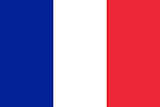
Premiere des französischen Softsex-Films Emmanuelle von Just Jaeckin (1940 - ). Der Film wurde in Frankreich und Thailand nach einem Roman der Thailänderin Emmanuelle Arsan gedreht. Der Film wird ein kommerzieller Erfolg.
Abb.: Plakat
[Bildquelle: Wikipedia. -- Fair use]
"Handlung Emmanuelle reist zu ihrem Ehemann Jean nach Thailand, der dort als Diplomat tätig ist. Der aufkommenden Langeweile und ihrer sexuellen Unerfahrenheit versucht sie durch erotische Abenteuer mit Freundinnen zu entkommen. Unter anderem lernt sie die Archäologin Bee kennen und verbringt mit ihr einige Tage und Nächte. Sie verliebt sich innerhalb kurzer Zeit in Bee, jedoch wird die Liebe nicht erwidert und Emmanuelle kehrt enttäuscht zurück zu ihrem Ehemann. Dieser bringt sie daraufhin mit dem Lebemann Mario zusammen, der sie in das Spiel der Erotik und die sexuelle Enthemmung einweisen soll. Durch philosophische Belehrung über das Wesen der sexuellen Befreiung und verschiedene, teilweise bizarre sexuelle Erfahrungen (Emmanuelle wird in einer Opiumhöhle vergewaltigt und bei einem Thai-Box-Kampf als Preis für den Sieger ausgelobt) durchbricht Emmanuelle ihre Grenzen, am Ende wird sie als gereifte, erwachsene Frau dargestellt.
Kritiken„Ein Sexfilm in kunstgewerblerischer Inszenierung, der das Elend Bangkoks als exotische Staffage mißbraucht, und seine eigentliche Absicht hinter pseudophilosophischen Ergüssen verbirgt. Allein die gediegene Kameraarbeit und die gute Besetzung unterscheiden ihn vom Gros des Genres.“– Lexikon des Internationalen Films[1]
„‚emanuela‘ ist das produkt einer korrupten männerfantasie. wenige klischees über frauen fehlen. ausserdem ist der film nicht nur sexistisch – frauen sind in der tat nur objekt – sondern auch rassistisch […] dass die handlung in fernost spielt, ist sicher kein zufall. mit der eintrittskarte kaufen wir einen werbeprospekt für die immer beliebter werdenden (herren)-reisen in die freie weite welt eines entwicklungslandes im fernen osten, wo frauen ständig verfügbar sind.“– Frauen und Film, 1974
„Dieser als ‚Filmhit aus Frankreich‘ angekündigte Film ist nichts weiter als ein mit kunstgewerblichem Ästhetizismus und pseudo-philosophischen Sprüchen (‚Liebe ist die Sucht nach der körperlichen Lust‘) aufgeblasener Boutique-Porno. Mit schönen Aufnahmen versucht er ständig, von seiner Verlogenheit und Dummheit abzulenken.“– Filmdienst"
[Quelle: http://de.wikipedia.org/wiki/Emmanuelle_%28Film%29. -- Zugriff am 2013-09-16]
1974-06-30
Die Regierung beschließt aufgrund von wochenlangen Protestveranstaltungen der Bauern:
- "The government would allow farmers to farm on the land they had lost, or on other land appropriated for them by the government.
- The government would take strict action against any landlords, money lenders, or other individuals who were found guilty of cheating the farmers.
- Those farmers who paid interest at higher rates than those set forth in the interest rate law, and who later lost their land due to foreclosure, would either regain their land or receive just compensation for it.
- The government would halt any attempt by landlords to transfer to others their rights over lands that had been seized.
- The government would appropriate land to needy farmers on a cooperative basis.
- The government would not arrest or file charges against any farmers who illegally occupied others’ lands through misunderstanding."
[Quelle: Morell, David ; Chai-anan Samudavanija [ชัยอนันต์ สมุทวณิช] <1944 - >: Political conflict in Thailand : reform, reaction, revolution. -- Cambridge, Mass. : Oelgeschlager, 1981. -- 362 S. : Ill. ; 24 cm. -- ISBN 0-89946-044-5. -- S. 217f.]
1974-07-01

Thailand schließt seine Grenzen für kambodschanische Flüchtlinge.
1974-07-04
Drei Tage schwere Unruhen in Bangkoks Chinatown (สำเพ็ง). Die Marodeure sind vor allem Mitglieder der chinesischen Banden "Eagles" und "Dragons". Die Banden werfen Bomben, setzen Benzin in Brand usw. Auslöser der Unruhen ist die Verhaftung eines Taxifahrers wegen Falschparkens. Ministerpräsident Sanya ruft den Ausnahmezustand aus. Schwerbewaffnete Polizei, Militär und Border Patrol Police (ตำรวจตระเวนชายแดน) werden eingesetzt. Ergebnis: 33 Tote, 124 Verletzte.
Abb.: Lage von Chinatown (สำเพ็ง)
[Bildquelle: OpenStreetMap. -- Creative Commons Lizenz (Namensnennung, share alike)]
1974-07-18
Die Regierung beschließt, das Eigentum der "drei Tyrannen" - Thanom Kittikachorn (ถนอม กิตติขจร), Praphas Charusathien (ประภาส จารุเสถียร) und Narong Kittikachorn (ณรงค์ กิตติขจร) - zu beschlagnahmen. Der Wert wird auf zwischen 700 Mio. und 1,4 Milliarden Baht geschätzt. Der Reichtum der drei Sittenwächter ist durch Korruption zustandegekommen.
1974-08

Das Königspaar residiert im Thaksin-Palast (พระตำหนักทักษิณราชนิเวศน์), Tambol Kaluwo Nuea (กะลุวอเหนือ), Provinz Narathiwat (นราธิวาส). Der Palast liegt bei einem muslimischen Friedhof. Die Muslime dürfen über das Palastgelände zum Friedhof gehen.
Abb.: Lage des Thaksin-Palasts (พระตำหนักทักษิณราชนิเวศน์)
[Bildquelle: OpenStreetMap. -- Creative Commons Lizenz (Namensnennung, share alike)]
1974-08
Puey Ungphakorn (ป๋วย อึ๊ง ภากรณ์ = 黃培謙, 1966 - 1999) schreibt:
"In my fight for freedom inside and outside the National Legislative Assembly during the past seven months, as to be expected, I have had to contend with much hypocrisy, distortion of facts, and even outright lies. Straight opposition, I welcome; crooked opposition saddens me. Pleas for freedom of conscience have been declared tantamount to cowardice, evasion, immoral, and even treason. Academic freedom has been attacked as dangerous license. When my friends and I advocate for freedom in political belief, we are branded communists ready to destroy monarchy. In the last resort, when our opponents run out of arguments, they play on my Chinese lineage, my Chinese name, and even my wife’s (English) lineage." [Zitiert in: Amyot, Jacques <1920 - >: remember Chula : memoirs of four decades of involvement in a Thai university, 1962-2002. -- Bangkok : Chulalongkorn University Social Research Institute, 2003. -- 307 S. : Ill. ; 26 cm. -- ISBN 9741325304. -- S. 192
1974-08
Chulalongkorn University (จุฬาลงกรณ์มหาวิทยาลัย): Konferenz der Thailand Association of School Administrators (TASA, สมาคมผู้บริหารการศึกษาแห่งประเทศไทย)
"Gegen das in Thailand verbreitete, oft als "Papageienmethode" [สอนแบบนกแก้ว - นกขุนทอง; nachplappern = auswendig lernen] bezeichnete gedankenlos memorierende Lernen wandten sich mehrere Teilnehmer der TASA-Konferenz: "(. . .) der Unterricht in der Klasse sieht so aus, dass die Schüler dem Lehrer von morgens bis abends zuhören müssen, ohne dass sie auch nur eine Stunde frei hätten, um selbst zu arbeiten. So kommt es, dass unsere Kinder zwar gut zuhören, aber kaum frei sprechen können (. . .)"
[Quelle: Liebig-Hundius, Ingrid <1947 - >: Thailands Lehrer zwischen "Tradition" und "Fortschritt" : eine empirische Untersuchung politisch-sozialer und pädagogischer Einstellungen thailändischer Lehrerstudenten des Jahres 1974. -- Wiesbaden: Steiner, 1984. -- 342 S. ; 24 cm. -- (Beiträge zur Südasienforschung ; Bd. 85). -- ISBN 3-515-04121-4. -- Zugl.: Hamburg, Univ., Diss., 1982. -- S. 127f.]
1974-08-08

Aufgrund der Watergate-Affäre tritt US-Präsident Richard M. Nixon zurück, um einem Amtsenthebungsverfahren zuvorzukommen.
1974-08-09

Vizepräsident Gerald R. Ford (1913 - 2006) wird als 38. Präsident der USA vereidigt.
Abb.: Vereidigung von Gerald R. Ford als US-Präsident, 1974-08-09
[Bildquelle: Robert L. Knudsen, White House Press Office / Wikipedia. -- Public domain]
1974-08-30
Zweiwöchiger Streik der Angestellten des Dusit Thani Hotel (โรงแรมดุสิตธานี). Anführer des Streiks ist Therdphum Chaidee (เทิดภูมิ ใจดี). Das Hotel reagiert mit Aussperrung und Hotelschließung. Schließlich gab die Hotelleitung den Lohnforderungen nach, die eine staatliche Schlichtungskommission vorgeschlagen hatte. 10% der Anteile am Dusit Thani Hotel gehören dem Crown Property Bureau (สำนักงานทรัพย์สินส่วนพระมหากษัตริย์).
Abb.: Lage des Dusit Thani Hotel (โรงแรมดุสิตธานี)
[Bildquelle: OpenStreetMap. -- Creative Commons Lizenz (Namensnennung, share alike)]
1974-08-30
Chai Wangtaku (ใช่ วังตะกู), ein Bauer aus Phitsanulok (พิษณุโลก), kommt nach Bangkok und erklärt, dass die Regierung es nicht ehrlich meint mit ihrem Vorsatz, den Bauern zu helfen. Der stellvertretende Ministerpräsident Prakob Hutasing (ประกอบ หุตะสิงห์, 1912 - 1994), erklärt, dass selbst Gott Indra (พระอินทร์) nicht helfen könnte. Der Bauernführer droht nun, dass er und 7000 Bauern ihre Identitätskarten verbrennen, damit ihre Thai-Staatsbürgerschaft aufgeben und auf dem Land "befreite Zonen" errichten würden.
Abb.: Gott Indra (พระอินทร์), Wat Suthat (วัดสุทัศนเทพวราราม), Bangkok
[Bildquelle: Mattana (มัทนา) / Wikimedia. -- Public domain]
1974-09-01
Laut The Nation <Bangkok> drohen 7000 Bauern in acht Provinzen, dass sie ihre Personalausweise wegwerfen und ein "befreites Land" gründen würden, falls die Regierung nicht ihre Forderungen bezüglich Ackerland erfüllt.
1974-09-03

Aufnahme diplomatischer Beziehungen mit der Deutschen Demokratischen Republik (DDR)
1974-09-08
Tod von Prinz Dhani Nivat Kromamun Bidayalabh Brdihyakorn (พระวรวงศ์เธอ พระองค์เจ้าธานีนิวัต กรมหมื่นพิทยลาภพฤฒิยากร) (1885 - 1974). Er war einer der Hauptakteure bei der Rekonstruktion des Zeremoniells usw. für König Bhumibol.
Abb.: Prinz Dhani Nivat - ธานีนิวัต
[Bildquelle: Wikipedia. -- Public domain]
1974-09-20
Das Parlament errichtet per Gesetz den Farmer's Welfare Fund: 80% des Exportzolls auf Reis müssen dafür verwendet werden, um Bauern zu helfen und den Reispreis stabil zu halten. 1974 beträgt der Exportzoll auf Reis 3,1 Milliarden Baht, 80% sind fas 2,5 Milliarden Baht.
1974-09-30
Siam Rath [สยามรัฐ]: Ragnab Wattanasing [วัฒนสิงห์], Leiter des Religionsdepartments (กรมศาสนา), wendet sich gegen die Freigabe von Abtreibung: das Individuum verdiene zwar Respekt, die Thai-Kultur erlaube freie Abtreibu8ng aber nicht. Eine solche würde freien Sex fördern, was "im Konflikt mit unserer schönen Kultur steht".
1974-10-01 - 1977-09-30
General Prem Tinsulanonda (พลเอก เปรม ติณสูลานนท์, 1920 - ) ist Kommandant der Zweiten Armee (กองทัพภาคที่ 2 - ทภ.2) (Hauptquartier: Nakhon Ratchasima - นครราชสีมา) und zuständig für die Kommunisten-Bekämpfung in Nordostthailand.
Abb.: Prem Tinsulanonda (พลเอก เปรม ติณสูลานนท์), 1984
[Bildquelle: USMilitary / Wikimedia. -- Public domain]
Abb.: Lage von Nakhon Ratchasima - นครราชสีมา
[Bildquelle: CIA. -- Public domain]
1974-10-01

Fast 10 Jahre nachdem sein Flugzeug über Laos abgeschossen worden war (1965-05-21) wird Captain Chaicharn 'Chip' Harnavee aus vietnamesischer Kerkerhaft entlassen. Mit ihm werden 63 weitere Thais entlassen.
1974-10-07
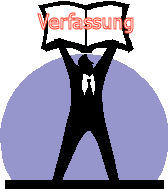
รัฐธรรมนูญแห่งราชอาณาจักรไทย พุทธศักราช 2517 - Constitution for the Administration of the Kingdom 1974 (10. Verfassung). In dieser Verfassung wird das Wahlalter von 20 auf 18 Jahre herabgesetzt. Dies ist als Geschenk an die Universitätsstudenten gedacht.
Art: endgültig
In Kraft: 1974-10-07 - 1976-10-09
Dauer: 2 Jahre
aufgehoben: Putsch

Der König hatte Bedenken gegen den Artikel, der dem Präsidenten des Privy Councils (คณะองคมนตรีไทย) das Recht geben sollte, Senatsmitglieder zu ernennen. Der König will, dass die Monarchie über der Politik schweben soll.
1974-10-09
Der Innenminister kündigt an, dass Bergvölker die Thai-Staatsbürgerschaft bekommen sollen. Die ca. halbe Million Angehörigen von Bergvölkern hatten keinen Zugang zu medizinischer Versorgung, Erziehung und anderen Bürgerrechten. Da aber viele Angehörige von Bergvölkern keine Geburtsurkunden haben, bleibt ihnen weiterhin der Zugang zur thailändischen Staatsbürgerschaft verwehrt.
Abb.: Wohngebiete der "Bergtvölker"
[Bildquelle: CIA. -- Public domain]
1974-10-14

Das Königspaar entzündet auf dem Sanam Luang (สนามหลวง) die Scheiterhaufen für 66 der vor einem Jahr getöteten studentischen Demonstranten. Bisher wurden nur Könige auf dem Sanam Luang kremiert. Ministerpräsident Sanya hält eine Lobrede auf die Ermordeten. Die Asche der Kremierten wird von einem Armeehubschrauber aus in die Mündung des Chao Phraya (แม่น้ำเจ้าพระยา) verstreut.
Abb.: Lage des Sanam Luang (สนามหลวง)
1974-10-15

Praderm Damrongcharoen, Herausgeber der Zeitschrift Sajjatham Party (พรรคศรัทธาธรรม) , wird von der Polizei wegen des Verbrechens der Majestätsbeleidigung festgenommen. In seiner Zeitschrift war ein Gedicht erschienen, in dem der König als Gott geschildert wird, der bei den Bergvölkern für Unterstützung wirbt, indem er ihnen Vieh schenkt. Auf Praderm wird landesweit eine richtige Hexenjagd gemacht. Am 1975-03-01 spricht ihn ein Militärgericht von der Anklage frei.
1974-10-17

Erstflug des US-Transporthubschraubers Sikorsky UH-60. -- Die Royal Thai Army wird 15 Stück in Dienst nehmen, die Royal Thai Navy 8 (+ 4).
Abb.: Sikorsky UH-60L der Royal Thai Army, 2012
[Bildquelle: Fuws260 / Wikimedia. -- Creative Commons Lizenz (Namensnennung)]
1974-10-18

Laut Far Eastern Economic Review sagt der König:
"The younger people do not know about the filth of politics. I became King when I was quite young. I was 18, and very suddenly, I learned that politics is a filthy business." Zu Universitätsstudenten: "The public is ready to support the students any time they see that student activities are beneficial to society."
"Communism can be worse than the Nazis or the fascists. In practice it is more terrible than a dictatorship."
1974-10-24
Gewerkschaftsführer Therdphum Chaidee (เทิดภูมิ ใจดี) in ประชาชาติสัปดาห์ (Prachachat Weekly):
Abb.: Therdphum Chaidee (เทิดภูมิ ใจดี)
"The Thai ruling elites are themselves capitalists. Hence they use their political power to advance their own business interests, making the workers’ struggle for justice more difficult." [Übersetzt in: Morell, David ; Chai-anan Samudavanija [ชัยอนันต์ สมุทวณิช] <1944 - >: Political conflict in Thailand : reform, reaction, revolution. -- Cambridge, Mass. : Oelgeschlager, 1981. -- 362 S. : Ill. ; 24 cm. -- ISBN 0-89946-044-5. -- S. 190]
1974-10-29
Bei einem Kampf zwischen Studenten der Dusit (ดุสิต) Engineering School, der Nonthaburi (นนทบุรี) Engineering School und der Bangsorn (บางซ่อน) Engineering School wird ein kleiner Bub durch eine Bombe getötet und 14 Personen verletzt.
1974-11

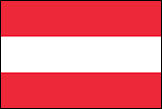
Margarete und Alois Payer besuchen erstmals Thailand.
1974-11
Gründung der สหพันธชาวนาชาวไร่แห่งประเทศไทย [Vereinigung der Bauern Thailands]
1974-11
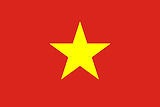
Nordvietnam nennt Bedingungen zur Verbesserung der Beziehungen mit Thailand:
"Thai authorities have sold out Thai independence and sovereignty, turned Thailand into a U. S. military base and compelled Thai youth to fight as mercenaries for the United States in its war of aggression in South Vietnam and Indochina. . .. With such a hostile policy toward Vietnam and Indochina, it is unrealistic for the Thai administration to talk about improving relations between the two countries. [An end to] Thai collusion with the U. S., in its policy of aggression against neighboring countries, is the fundamental condition for the establishment of friendly relations between the two countries."
[Zitiert in: Randolph, R. Sean: The United States and Thailand : alliance dynamics, 1950-1985. -- Berkeley : Institute of East Asian Studies, University of California, 1986. -- 245 S. ; 23 cm. -- (Research papers and policy studies, 12). -- ISBN 0-912966-92-0. -- S. 176]
1974-11

Unter den fremdsprachigen Bestsellern von D.K. Bookhaouse (Bangkok) steht an dritter Stelle
Neill, A. S. <1883 - 1973>: Summerhill : a radical appoach to child rearing (1960)
Abb.: Umschlagtitel 1960
1974-11-04
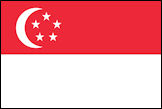
M. R. Kukrit Pramoj (หม่อมราชวงศ์คึกฤทธิ์ ปราโมช , 1911 - 1995) gründet die Social Action Party (พรรคกิจสังคม) nach dem Vorbild von Lee Kuan Yew's (李光耀, 1923 - 2015) People's Action Party in Singapur. Die Anregung zur Parteigruündung kommt von Boonchu Rojanastien (บุญชู โรจนเสถียร / 黃聞波, 1921 - 2007), Direktor der Bangkok Bank (ธนาคารกรุงเทพ). Für Boonchu ist Lee das Vorbild eines guten Staatsmanns.
Abb.: ®Logo
1974-11-11
Tausende von Häftlingen in zwei Gefängnissen rebellieren, weil die Regierung dieses Jahr keine Amnestie bewirken will.

Die Regierung will dem König die Entscheidung über eine Amnestie überlassen. Dieser weigert sich aber, in die Angelegenheit hineingezogen zu werden, und fordert, dass die Regierung selbst entscheiden soll.
1974-11-18 - 1974-11-29
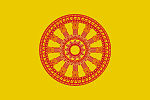
Tausende von Bauern demonstrieren in Bangkok, da die Regierung das Problem der Landlosen immer noch nicht gelöst hat. Den Bauern gesellen sich Studenten hinzu. Auch Mitglieder der Young Buddhist Monks Group of Thailand (คณะยุวสงฆ์แห่งประเทศไทย, Generalsekretär: Phra Maha Jud Kongsuk [พระมหา กองสุข]) nehmen teil.
1974-11-19
Gründung von The Farmers Federation of Thailand (FFT - สหพันธ์ชาวนาชาวไร่แห่งประเทศไทย). Vorsitzender: Chai Wangtaku (ใช่ วังตะกู), ein Bauer aus Phitsanulok (พิษณุโลก); Stellvertreter: Intha Sribunruang (อินถา ศรีบุญเรือง, ermordet 1975), Bauer aus Chiang Mai (เชียงใหม่). Die Federation ist besonders tätig in den Provinzen
- Chiang Mai (เชียงใหม่)
- Chiang Rai (เชียงราย / เจียง
ฮาย) - Lampang (ลำปาง)
- Lamphun (ลำพูน / หละปูน)
In diesen Provinzen ist der Anteil an Pachtland besonders groß. In der Provinz Chiang Mai gehören Mitte 1975 schätzungsweise 100.000 Bauernfamilien dem FFT an.
Abb.: Lage der genannten Provinzen
[Bildquelle: CIA. -- Public domain]
1974-11-21
Tod des nordostthailändischen Schriftstellers Rom Ratiwan (รมย์ รติวัน aka. Thawi Ketawandi - ทวี เกตะวันดี, geb. 1932)
Er schrieb eine regelmäßige Kolumne für die Zeitung Daily News (เดลินิวส์). Von 1963 bi2 1965 war er Präösident der Journalist's Association of Thailand.
Abb.: Einbandtitel des 1980 postum erschienenen Romans: โทนเทวดา นักสู้จากที่ราบสูง ("Thon Thewada : Kämpfer aus der Hochebene")
1974-11-29

Demonstration von Bauern für eine Landreform. Die Spitze bilden 100 Mönche.
1974-12
Ein Flugblatt der Farmer's Federation of Thailand (FFT - สหพันธ์ชาวนาชาวไร่แห่งประเทศไทย) berichtet, dass in Chiang Mai und Lamphun Bauern in 600 Fällen dem Mobbing der Grundbesitzer widerstanden haben und in 100 Fällen sich geweigert haben, mehr Pacht als das gesetzliche Maximum zu bezahlen.
1974-12-03

Ca. 400 Mönche demonstrieren auf dem Sanam Luang (สนามหลวง) gegen das von der höchsten Mönchsbehörde ausgesprochene Verbot für Mönche, zu demonstrieren oder an politischen Aktionen teilzunehmen. Die Mönche argumentieren, dass sie von den Bauern ernährt würden und darum politische und soziale Pflichten gegenüber den Bauern hätten.
"Despite this legislative victory for the farmers, by the end of 1974 left-right polarization had become the dominant trend. Even the monks could not escape this conflict, an unprecedented phenomenon in Thailand. These young monks considered their participation in the farmers’ protest to be legitimate, because they believed that monks should help people rather than serving the rich and powerful. As further justification they cited examples of senior monks who gave blessings to soldiers and warplanes, presided over ceremonies opening massage parlors, and so on. The monks’ participation in the protest march engendered sharp and widespread public criticism, including numerous newspaper editorials. More than any other single action up to that point, this step resulted in withdrawal of support for the farmers and other progressives by many ordinary people who had earlier joined in the students’ demonstrations. The temporary alliance was crumbling, as the pressures of events radicalized the student, farmer, and labor activists while isolating them more and more from of the mainstream of society." [Quelle: Morell, David ; Chai-anan Samudavanija [ชัยอนันต์ สมุทวณิช] <1944 - >: Political conflict in Thailand : reform, reaction, revolution. -- Cambridge, Mass. : Oelgeschlager, 1981. -- 362 S. : Ill. ; 24 cm. -- ISBN 0-89946-044-5. -- S. 221f.]
1974-12-06
Das Parlament verabschiedet mit einer überwältigenden Mehrheit den Land Rent Control Act.
1974-12-08


Das Königspaar besucht Wat Wiset Chai Chan (วัดวิเศษชัยชาญ) und Wat Si Roi (วัดสี่ร้อย), Amphoe Wiset Chai Chan (วิเศษชัยชาญ), Provinz Ang Thong (อ่างทอง). Die Bewohner von Wiset Chai Chan sind Nachkommen von Kriegern, die in Ayutthaya (อยุธยา) gegen die Burmesen gekämpft hatten. Wat Si Roi (วัดสี่ร้อย - "Tempel der 400") dient der Erinnerung an 400 dieser Krieger.
Abb.: Lage von Amphoe Wiset Chai Chan (วิเศษชัยชาญ)
[Bildquelle: OpenStreetMap. -- Creative Commons Lizenz (Namensnennung, share alike)]
1974-12-08

Der Mönch Phra Maha Jad Khongsuk (คงสุข) kündet die Gründung einer Federation of Thai Buddhists an. Die Federation soll die Demokratisierung des Mönchsordens fördern sowie die Orientierung des Ordens auf sozialen Dienst.
1974-12-12

Laut The Nation <Bangkok> sagt General Krit Sivara (กฤษณ์ สีวะรา, 1914 -1976), dass die Tatsache, dass Mönche eine Demonstration anführen, ist "the end of everything. There is nothing more serious than this."
1974-12-18
Land Rent Control Act
"It is sufficient at this point to note that the new Kukrit Pramot government, sensitive to electioneering and populist pressures, was compelled to rush through the Agricultural Land Rent Control Act of 1974, which became legally effective on 18th December 1974. The provisions, had they been enforced and supervised, would have gone a considerable way to meeting some of the most pressing demands of tenant farmers. The 1974 Act required a contract, whether written or oral, for all tenancies; in effect it converted existing tenancy agreements into contracts, to last for six years from the date of the Act. These contracts could be renewed indefinitely for further six year periods except in cases of exceptional necessity and with the agreement of the tenant. It limited the payment of rent to once a year regardless of the number of crops grown. It stipulated that normally the product of the main crop should be divided into three parts: a minimum of one-third for production costs, the remainder to be divided equally between landlord and tenants. The rent should be reduced if harvests were poor, and no rent should be required if the yield was less than one-third of the average or usual harvest. Conflicts should be settled by a committee to contain an official, the landlord and the tenant. The basic provisions would have reduced rents from a norm of 50%, more or less and sometimes for each crop, to a maximum of a single rent of 33 1/3% and would also have provided the tenant with security of possession and a number of other safeguards."
[Quelle Andrew Turton <1938 - >. -- In: Thailand, roots of conflict / edited by Andrew Turton, Jonathan Fast, Malcolm Caldwell. -- Nottingham : Spokesman Books, 1978. -- 196 S. ; 22 cm. -- ISBN 0851242383. -- S. 119. -- Fair use]
1974-12-24
Bangkok Post über Thawit Klinprathum (ทวิช กลิ่นประทุม, 1930 - 2006), Vorsitzender der Social Justice Party (พรรคธรรมสังคม):
Abb.: Einbandtitel
"While working on subcontracts from the Express and Transportation Organization [ETO—a state-owned corporation intimately tied to JUSMAG, Joint US Military Advisory Group] unloading and transporting equipment, he realized the need for trailers. With the money he had saved and credit from the bank, he purchased two trailers to deliver heavy machinery and equipment... He started carrying equipment for JUSMAG and Accelerated Rural Development (ARD). Mr. Dewitt chose the right time to buy his trailers because mechanization was becoming necessary for economic development. With no other local companies possessing trailers and cranes, his company, Trailer Transport Company, secured a contract for transporting military equipment ... His godown expanded and his trailers and trucks numbered in the hundreds as the transportation network in the country expanded." Bangkok Post, December 24, 1974 (special advertisement paid for by the Social Justice party)" [Zitiert in: Anderson, Benedict R. O'G. (Richard O’Gorman) <1936 - >: Exploration and irony in studies of Siam over forty years. -- Ithaca, NY : Cornell, 2014. -- 166 S. : Ill. ; 26 cm. -- (Sudies on Southeast Asia series ; no. 63). -- ISBN 978-0-87727-763-7. -- S. 55, Anm. 32]
1974-12-26
Bewaffneter Kampf zwischen Studenten der Bangsorn (บางซ่อน) Engineering School und der Northern Bangkok Engineering School. ein toter Student und mehrere Verletzte.
1974-12-27
Kampf zwischen Studenten der Dusit (ดุสิต) Construction School und der Archivasilpa (อาชีวศิลป์) School: drei durch Messerstiche und Schusswunden verletzte Studenten.
1974-12-27

Der frühere Ministerpräsident Thanom Kittikachorn (ถนอม กิตติขจร) mit Gattin versuchen in Thailand einzureisen. Thanom will Mönch werden. Er wird aber nach Singapur abgeschoben.
Abb.: Lage von Singapur
[Bildquelle: OpenStreetMap. -- Creative Commons Lizenz (Namensnennung, share alike)]
ausführlich: http://www.payer.de/thailandchronik/ressourcen.htm
Zu Chronik 1975